
HELEN MIRREN
‘‘I’d



“THE







‘‘I’d



“THE








Choosing a care home is a big decision, but there are many positive steps you can take to make it much less stressful
While more than 50 per cent of us fully intend to think about care options at some point,* most of us don’t get round to it until forced into making a rushed decision, adding confusion when we need to feel calm and reassured. Feeling confident about your decision will ensure a worry-free and positive move into a care environment.

In the first of a six-part series, we answer some key questions to make you feel confident you’re making the right choice.
No two care homes are the same, so why not pop in for a visit?
Nearly 60 per cent of people are worried that the standard of care would not be good enough for their loved ones.*
Nothing beats personal investigation, as every home is di erent and caters for di erent levels of care, such as residential, respite, dementia and nursing. It’s always best to visit, so you can understand fully what type of care would best suit your, or your loved one’s, needs, meet sta and residents, and ask lots of questions. Bupa Care Services have an open-door policy: you’re welcome to drop in at any time, or call ahead and make an appointment to meet the home manager.
What should I look for to feel more comfortable about a care home?
Warm, friendly sta ; homely atmosphere; cleanliness; residents’ testimonials; and flexible visiting hours.* Round-the-clock
sta ng is important too—Bupa has sta on duty all night, who will, for example, kindly and expertly persuade an Alzheimer’s resident who gets up in the early hours back into bed. Get Bupa’s guide “Planning for Your Needs in Later Life” from bupa.co.uk/individuals/ care-homes/request-a-guide.
Do care homes cater for specialised needs?
It’s essential to get the right care for the right resident. With almost 300 nursing and residential homes across the UK, Bupa o ers a wide range of specialised services, such as care for dementia and for the young and physically disabled. And there are organisations that o er independent advice and support on making the right decision about specific needs.
What home-from-home qualities should I expect?
Check out communal areas, such as the TV lounge and dining room, the gardens and sunny spots for sitting outside. Make sure you visit a room too. Look at the menus and why not stay and sample a meal? Bupa welcomes guests at mealtimes—a happy way for, say, a grandchild to get together with granny, and a perfect example of how a care home can strengthen relationships: with family-care stresses removed, there’s plenty of time for loving.
Should there be plenty of activities?
Residents are stimulated mentally and physically, whatever their age or state of health, by a wide range of group activities, as well as individual ones to encourage them to keep up favourite hobbies, and their passion for life. (If a resident has a particular interest, they just need to let the activities co-ordinator know.) At one Bupa home, a 90-year-old keen gardener with spinal cord injury, who can walk with aids,

initiated a project to design five new flower beds. Care is about life enrichment.
68.5 per cent of us have no idea how care is funded, while 33 per cent have made no financial provision for ourselves.* Care-home fees are separated into living costs and medical-care costs, and depend on the level and type of care (residential or nursing), location, facilities, bedroom and so on. When you visit a Bupa home, the care-home manager can give you a basic idea of costs and information on options, while organisations such as Eldercare are able to provide expert financial advice to help you plan ahead.


Catherine Haughney, editor of Reader’s Digest, welcomes you to the July issue
Tell us what you think of this issue: theeditor@readersdigest.co.uk
Like us on Facebook: facebook.com/readersdigestuk
Follow us on twitter: twitter.com/rdigest
Stories featured on the cover are shown in red

“Creating an image for Reasons to Be Cheerful was a bit of a challenge,” says Justin Gabbard “But I come up with my best ideas listening to radio on the way to the studio, so commuting helps!” p30

“Bosnia grabbed our attention in the 1990s,” journalist John Hooper points out. “Yet few realise that people are still being killed and maimed because of the war.” p56

“Anger was once a valued survival tool, but now—with little around to threaten our existence —it’s become a relic, misfiring at the slightest provocation,” says Dr Sandi Mann p92


Eileen Benham won’t take no for an answer. Find out why on p76

Helen Mirren, our cover face this month, certainly seems to be a woman who has it all: brains, beauty, a successful career and a great marriage. But more important than any of that, she’s the sort of woman you could have a really good laugh with, as we discovered when we interviewed her. Turn to p34 to read all about her exciting new action movie RED 2, filming her first-ever car chase and why working with Anthony Hopkins is a “match made in heaven”.
Of course, the big news this month will concern the patter of tiny feet for a certain royal couple. But did you know that Prince William was the first future monarch to be born in a hospital? We’ve got lots of other surprising facts about royal babies on p26.
And if you want to find out what we get up to between issues, read our fantastic new blog at readingthedigest.com. Reader’s








Send us your stories, jokes and letters—if we publish, we pay!
£50 for the star letter and £30 for regular letters.
Email readersletters@readersdigest. co.uk or write to Readers’ Letters, Reader’s Digest, 9th Floor, 1 Eversholt Street, London NW1 2DN
£50!



Digest, Visit readersdigest.co.uk or write to Reader’s Digest, PO Box 444, Douglas, Isle of Man IM99 3ZF.
£50 for the true stories, anecdotes, jokes in Laugh! and You Couldn’t Make It Up…, and contributions to end-of-article fillers, Travel and Gardening. Email excerpts@ readersdigest.co.uk or write to Excerpts, Reader’s Digest, 1 Eversholt Street, London NW1 2DN
Europe: £50 a year. Rest of the world: £60 a year. Prices include delivery. For Gift Subscriptions contact Customer Services below SUBSCRIBE!
UK: £42 a year. Republic of Ireland: €74.39 a year.
Contact Customer Services for renewals, gifts, address changes, payments, account information and all other enquiries. Phone: 0871 351 1000 (Calls from a BT landline will cost 10p a minute. Call costs from other providers may vary.) Email: customer_ service@readersdigest.co.uk
Minicom: 0870 600 1153.
twitter.com/rdigest
Reader’s Digest is available in a talking edition for blind and partially sighted people for £16. For details, phone: 01435 866 102; email: info@ tnauk.org.uk, website: tnauk.org.uk.
Ensure submissions are not previously published. Include your name, email, address and daytime phone number with all correspondence. We may edit letters and use them in all print and electronic media. Contributions used become world copyright of Vivat Direct Ltd (t/a Reader’s Digest).
We cannot acknowledge or return unpublished items or unsolicited article-length manuscripts. Do not send SAEs. Articlelength stories, poetry and cartoons are not requested.
bfacebook.com/readersdigestukReadingTheDigest










































WELCOME TO OUR NEW BLOG!
With book and interview extracts as well as wonderful features from our archives, you’ll find we’ve got plenty of hot talking points at readingthedigest.com. Come and join us!

Read our fascinating feature about Britain’s islands on p40, then go to readersdigest.co.uk/magazine and take a trip to some of the more obscure (and downright weird) tiny islands around our coast.
CHECK OUT our fabulous apps, too!



Go to the App Store, iTunes music store, Google Play Store and Amazon to download our magazine apps onto your iPad, Kindle or tablet.
Kindle or tablet.





















Key role in the maintenance


Unprecedented levels of DHA 155mg and EPA 205mg
Exclusively sourced from sustainable fisheries in Iceland


Natural St Clement’s oils to reduce the ‘yuk’ factor
Purified using advanced, ‘filter pure’ technology









































If you spit blood when you brush your teeth, it could be an early sign of gum disease, a leading cause of tooth loss. So, if you spit blood in the sink when you brush your teeth, try Corsodyl Mint Mouthwash. Nothing is more effective at treating gum disease.* Find out more at www.corsodyl.co.uk
CLINICALLY PROVEN. FOR PEOPLE WHO SPIT BLOOD WHEN THEY BRUSH THEIR TEETH.

*Over the counter medicines only. Corsodyl Mint Mouthwash contains chlorhexidine digluconate. Bleeding gums can be a sign of gum disease and not treating may lead to tooth loss. Always read the label. CORSODYL is a registered trade mark of the GlaxoSmithKline group of companies.
£30 FOR EACH PUBLISHED LETTER, £50 FOR THE LETTER OF THE MONTH!
SEE P6 FOR MORE DETAILS


While not wishing to downplay the audacity of the raids outlined in “The Dambusters: Then and Now”, or the bravery of the pilots of 617 Squadron who dropped the bouncing bombs on the Moehne and Edersee dams, I feel we should remember the 1,600 people who drowned in the resulting floods, including many POWs and foreign labourers.
The squadron’s motto “After me, the Flood” took on another meaning for anyone who witnessed the devastation, including a family friend who was ten years old at the time. She recalls a torrent of water covering everything in its wake. When it receded, bodies had to be plucked from the trees and roof tops. It’s also uncertain as to whether these raids had any great impact on the German war e ort.
Ingrid Allan, Halifax, West YorkshireThe weather was something to moan about last month, with 60mph gales and torrential rain. In response, I reread Michael Portillo’s Maverick article praising the British weather, and it really changed my outlook.
Teeth gritted, I went out for my usual walk, but it was di cult to shrug o the wind and rain. I dashed to the nearest shelter and saw an old chap there.
“Don’t moan about the weather— it’s made Britain great!” I quoted, trying to be cheerful. “I’d sooner it’d been done with something like a decent climate!” he replied.
Alan Andrews, Devon
It’s all very well for Michael Portillo to spout on about the British weather, but the fact that he’s always a deep shade of orange proves that he spends more time abroad than he does basking in the rain. Either that, or he has shares in fake tan.
Esther Newton, Berkshire
I was intrigued to read Gary Rimmer’s In the Future item about the Walking Buddy, the

Tabitha Wild @tabithawild
Yesterday I read an entire copy of @rdigest cover to cover. I have a few months to catch up on and a lot of time to do it. #lifeofanextra

GPS-equipped walking stick developed to help physically fit dementia su erers find their way around.
I don’t su er from dementia but, like many people I know, I can get lost in a small building, let alone my home town. I’d love to be able to whip out a Walking Buddy, pass it o as a special hiking pole or a present for my grandmother, and move o casually in the appropriate direction. Well done, Reader’s Digest, for keeping up with such technological advances!
Eleanor Lancaster, Gwynedd
I enjoyed reading “What the Tree Saw”—it was informative and it also made me smile. And I can’t help feeling that history taught this way in schools would be a lot more fun.
M P Crook, Dunfermline
If the Great Yew at Runnymede had looked more closely, it would have noticed that King John didn’t “sign” Magna Carta. What he did was to set his royal seal upon it—which, in a largely illiterate society, gave the same
authority as a signature on a document today.
Michael Davidson, London
“Running for Mandela” shows that Eddie Izzard does a lot of good, but I feel that some of his comments regarding UKIP deserve a rebuttal.
I’ve been a lifelong trade unionist, supporter of Old Labour and anti-racist, but I was also one of the founders of UKIP. To be opposed to the EU isn’t an indication of being right wing or anti-European. Those of us wishing to leave the EU are motivated by a love of democracy and a rejection of the Brussels bureaucracy—it has nothing to do with wishing to “run to the hills”. Mr Izzard is also wrong to bracket UKIP with the BNP, as the former has no truck with anti-Semitic or racist policies.
Colin Bullen, Kent
“UKIP HAS NO TRUCK WITH ANTISEMITIC OR RACIST POLICIES”
It’s been suggested that the youth of today can’t string a sentence together. But after reading the under-18 entries to your 100-Word Story Competition, it’s obvious that this isn’t the case. Some people have even claimed that the next generation has no imagination—what a joke! The future’s looking bright.
Philippa Sampson, Devon

















































Building on over 30 years of innovation and research, the Bose ® Wave ® music system III delivers award-winning, room-filling quality sound, yet this compact, all-in-one system takes up less space than a single conventional speaker. The Wave ® music system III reproduces music with the most accuracy we’ve ever produced in a system this small. You’ll hear details you’ve never noticed in songs you know by heart, delivering room-filling sound with depth and definition.
The system’s front-loading CD player and digital DAB/FM/AM tuner offer you two ways to experience your favourite music, while the digital display shows track information as you listen. Touch-top controls turn the system on, off and snooze the alarm, and the slim, credit-card sized remote offers one touch controlof all the system’s functions. The Wave ® music system III also features dual alarms for two different wake-up times making it one of the most convenient devices you can own.
Music from your iPod, iPhone*, computer or tablet.
Available accessories bring music from your iPhone or iPod*, or wirelessly from your tablet, computer or other Bluetooth® device. And being compact, the Wave ® music system III fits neatly just about anywhere – so you can enjoy all kinds of music in all kinds of places.
Hear it for yourself, risk-free.
We believe the best way for you to appreciate the Wave ® music system III is to experience it in your own home. So call now and listen for 30 days without risk or obligation.
*Dock not compatible with iPhone 5 and iPod shuffle.**Payment plan is available on credit/debit cards only and is subject to status. An initial deposit is due at the time of order and all payments will be charged to your credit/debit card. If the product is returned, the deposit is fully refundable. ere will be no interest charges from Bose. In the event of late payment, credit/debit card company interest charges may apply. Deliveryis subject to product availability, clearance of payment and security checks and can be up to 10 days from when Bose receives the order. Price/Payment plan / Offer subject to change without notice. Free shipping offer applies to UK standard delivery only. Risk free refers to 30-day home trial only. ©Bose Corporation 2013. All rights reserved. e Wave ® music system’s distinctive design is a registered trademark of the Bose Corporation in the U.S. and other countries. e Bluetooth® word mark is a registered trademark owned by Bluetooth SIG, Inc., and any such use by Bose Corporation is under license. iPod and iPhone are registered trademarks


Author and BBC4 Review
Show critic Natalie Haynes on the new releases
It’s fair to say that there isn’t a film all year I’ve been looking forward to as much as this. A prequel to Monsters, Inc—which I’m horrified to discover came out 12 years ago—it finally shows us how Sulley (John Goodman, never better, and that’s saying something) and Mike (Billy Crystal, reprising his terrific role) met at college, long before they worked at the power station.
It’s a rare Pixar movie that’s anything less than excellent. Their screenplays are consistently clever, always funny and genuinely moving. And the buddy-movie relationship between Sulley and Mike rivals that of Woody and Buzz in Toy Story

I can still be reduced to helpless laughter by that sneak peek of their impromptu musical in the first film.
I really can’t wait: see you in the cinema queue on July 12. I’ll get the ice creams!
Frances Ha
The eponymous lead in this charming film could have walked straight out of an early Woody Allen movie— she’s tall, gawky, beautiful and a New Yorker completely without cynicism. She’s also played by Greta Gerwig, who appeared in Woody Allen’s recent To Rome With Love. And she’s played with considerable skill—any less charm and you might want to shake her. Frances belongs in a happier version of the US comedy Girls She’s 27, can’t find an apartment, and is (in the words of her male roommate) undatable. She wants to be a dancer, but she’s not quite good enough to make it out of the understudy pack. She loves
Richard Gere stars as the compromised anti-hero in this Wall Street-esque morality tale. Susan Sarandon steals the odd scene as his wife.
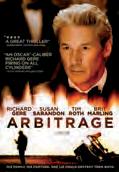




Ruth Mansergh, 40, freelance writer
Jumping for joy: Greta Gerwig in Frances Ha
Watching: Have I Got News
For You (BBC1) Ian Hislop’s knowledge and Paul Merton’s surreal wit always fill this programme with laughter.
Listening: The Beach Boys
You can’t help but smile when you listen to them, and they’re playing Hyde Park this month.
Stoker A
Hitchcockian Englishlanguage debut from director Park Chan-wook (Oldboy) starring (left) Mia Wasikowska (Alice in Wonderland).
her best friend too much and can’t make herself fit into social situations. And thanks to a sharp, often hilarious script from Gerwig and writer/ director Noah Baumbach, we’re mesmerised by her rather belated coming-of-age story. A quarter-life crisis with a big heart and a smart mouth.
Reading: The Dark Tower series by Stephen King Follows the quest of gunslinger Roland Deschain in a vivid, magical, fantasy world.
Online: dailymail.co.uk Well, the reader comments on articles. The “common sense prevails” attitudes provide amusement.


Music’s Stuart Maconie’s pick of the recent releases
Kveikur by Sigur Rós Think the LSO meets The KLF. Sigur Rós’s trip over the past decade or so from churning, haunting noisescapes to the outskirts of the mainstream has been ba ing but heartening. Their music may have mellowed into a limpid ambient rock that’s perfect for football montages, but it’s still a strange proposition. Kveikur has a glut of dark tracks such as “Brennisteinn”—excursions into abstract sound lit by the occasional orchestral explosion.
Kill the Wolf by Matt Berry
Think the best brand-new record from 1972 you’ll ever hear. The James Mason of comedy acting (a louche baritone who lit up TV’s The IT Crowd), Matt Berry is also a musician who makes BBC 6
delightful okilter pastoral prog pop in his bedroom studio.
Kill the Wolf is a great leap on from 2009’s Witchazel, by turns sunlit and airy (“Medicine”), then complex and brooding (“Solstice”). With any luck, this is where he becomes known as a genius songwriter who happens to be a great comedy actor.

Yeezus by Kanye West Think the twisted, megalomaniac Jay-Z. This album’s title conflates “Jesus” and Kanye’s nickname, Ye. The rapper is not a man overburdened by doubt and, given his half-baked opinions, he’d be intolerable—if his records weren’t so occasionally brilliant. Yeezus contains gnarled, doomy anthems of rage that are as sonically challenging as anything in mainstream pop. I’ll never forgive him for being so rude to Taylor Swift at the MTV Awards but he, or his musical collaborators, certainly have something.


Technology expert, LBC presenter and Answer Me This! podcaster
Olly Mann reveals the latest must-haves
July 1–7
National Shed Week
July 9–14
RHS Hampton Court Palace Flower Show, East Molesey, Surrey
July 9–14
Llangollen International Musical Eisteddfod, Denbighshire, Wales
July 26
Mick Jagger turns 70
Luci Inflatable Solar Lantern, £19.99
A camping lantern is a music-festival must-have; useful to find your tent, and just for fumbling around inside said tent, desperately trying to locate your earplugs. Luci is an inflatable, water-resistant LED lantern with three light
Hotel Tonight, free app Impulse getaways seem appealing, but turning up at a decent hotel looking for a bed at the last minute isn’t always that wise. If you can bear to compromise your seize-the-day philosophy, download





settings: dim, bright and emergency
It’s
flashing. It’s solar-powered, so you never need to change the batteries. And it holds its charge for two months, so it’s Britishsummer ready! Clever stu .

Prezzybox Swim-Fin, £19.95
This shark-like float can help your kids learn to doggy paddle. Sadly, it can’t train them not to wee in the pool.

this app before setting o . It’s clean, simple to use and updates at noon each day with discounted deals on quality hotels for that evening. So when you arrive in your chosen city, you can head straight to the minibar.
Netatmo Urban Weather Station, £159
Stick one of these units in your garden and you can monitor the temperature, humidity and air pressure from your smartphone.



Relive Jessica Ennis’s triumph on July 26–28


ESPNcricinfo cricket blogger, broadcaster and stand-up comedian Andy Zaltzman previews the best of the month’s action
Anniversary Games, Olympic Park, London, July 26–28 Many of the universe’s top runners, leapers and hurlers recongregate to mark a year since the Olympics, when all real news was suspended and Britain was, consequently, happier than it’s ever been. Usain Bolt will seek to rekindle some glorious memories, for slightly less than ten seconds.

Penshurst Ladies vs Fordcombe
Ladies Stoolball, July 22
Stoolball hasn’t been a sport that su ers from saturation coverage in the British or global media. That changes here. And that changes now.



The stoolball heartland of west Kent plays host to the titanic Penshurst–Fordcombe clash: two implacable local rivals, separated by a couple of miles, a small river and a slightly di erent selection of real ales in their village pubs, facing o in an elemental clash of history, culture and politics. With bats shaped like frying pans and Stoolball: a possible rival to The Ashes?
a square bit of wood on a stick, in a game that can be best described as a bit like cricket.
The Ashes 1st Test, Trent Bridge, July 10–14 Test cricket’s oldest showdown returns for its 67th instalment. A good start will be essential, so the first of the five Tests could well be crucial.
The Ashes 2nd Test, Lord’s, July 18–22 Actually, scratch that. Only once in the last four Ashes has the series winner won the first Test. But the victors in 11 of the last 12 second Tests have gone on to claim the urn. So take five days o to write your autobiography during the meaningless first Test, and nail yourself to your sofa for the crucial second.
England seek a fourth win in five series, and their high-class bowling attack of Anderson, Broad, Finn and Swann should prove decisive against a fragile Australian top order. However, the home side’s batting has become worryingly passive, and the Aussies’ youthful seamers could discomfit them considerably. ■
¶ I RECENTLY ATTENDED SUNDAY MASS AT A local Catholic church. The priest spoke animatedly about the Gospel, in particular the Prodigal Son— the story of a father and his two sons, one of whom squanders his share of his father’s wealth, lives in poverty and returns home to ask forgiveness, while the other begrudges the father’s gesture of killing a fatted calf and celebrating his wayward son’s return.
Having finished, the priest darted among the congregation asking the question, “Who do you think su ered the most in this story?” We all looked down, not wanting to catch his eye. Eventually, after a very long silence, a young girl put her hand up.
“The fatted calf?” she volunteered.
Maria Urquhart, Cork

¶ Working as an on-call surgeon one weekend, I was called to A&E to see a young man with a large cut on his cheek. He was very anxious, and looked scared when I explained to him that he needed minor surgery under local anaesthetic.
To make him feel at ease, I chatted away while stitching his face, asking him what he did for a living. He replied that he was unemployed, before asking, “And what do you do?”
Alia Shah, Glasgow

¶ While on holiday, my parents played a game where they tried to guess what their fellow hotel guests did for a living, then went up to their table to see if they were right.
One evening, they’d correctly guessed a couple of teachers, a travelling salesman and a farmer, so they were confident when they spotted an angelic-looking couple in the corner of the dining room—a vicar and his wife, they decided.
It came as something of a shock when the couple revealed instead that they ran a brothel in Germany. My parents never played the game again.
Andrew Berry, Lincoln
¶ “I used to play that with the school orchestra,” boasted my wife as we listened to a
piece of music from Tchaikovsky’s Swan Lake. Dusting o her old flute, she gave a rendition that sounded nothing like the music I’d just heard on the radio.
Noticing my puzzled look, she explained in a hu , “Well, you have to imagine it accompanied by a full orchestra.”
I’m only glad she never played the triangle.
Steve Strode, Liverpool


¶ “When will I get hairs under my arm?” my ten-year-old son asked one evening.
“When puberty hits you,” I replied, trying not to smile.
An alarmed look came over his face. “Has he already hit my sister?” he asked, having taken my explanation a bit too literally.
Maria Parkin, Doncaster
¶ I was working in a hotel bar when a plump woman who’d
¶ WE DECIDED TO UPDATE our GP practice so it was fully computerised. But our 75-year-old receptionist was having trouble getting used to the program.
One day she called the
“I’m sorry, Harry, but I need a change. I’m leaving for a job in PR”
YOUR TRUE, FUNNY STORIES. EMAIL excerpts@ readers digest.co.uk OR GO TO facebook. com/readers digestuk

been drinking excessively suddenly climbed on a table and started dancing.
The manager was called and, after observing the spectacle, remarked, “Great legs.”
“Do you think so?” said the dancing woman, smiling and revealing a bit more.
“Definitely,” replied the manager. “Most tables would have collapsed by now.”
Jillian Cohen, Yorkshiresupport team to complain that the system didn’t allow her to book appointments on a particular page. The assistant told her that, in order to do this, she needed to open a new window.
At this, our receptionist exploded in frustration.
“We can’t call a builder to put in a new window every time we want to book in a patient!” she shouted.
Kimia Mirzakhani, Hertfordshire















How style-conscious are you?

The 1980s witnessed an explosion in the world of music and fashion, from BLITZ magazine
to the Blitz Kids (right). To coincide with the start of the V&A’s exhibition “Club to Catwalk: London Fashion in the 1980s”, we’re testing your knowledge of words related to all things sartorial. Answer A, B or C below.
1 décolletage n (day-col-letage) A low-cut neckline B school uniform C clothing sale
2 sartorial adj A relating to a tailor or tailored clothes B relating to shoes C made out of wool
3 ruched adj (roosht) A tied in a bow B pleated or bunched C dyed blue
A boast that consists of openly admitting to failings in a way that proves you’re confident enough not to care what others think of you. Closely related to “humblebrag”, a Twitter staple.
RD Rating: Useful? 7/10 Likeable? 4/10
4 argyle adj A in pinstripes B in diamond patterns
C polka-dotted
5 twee adj A spotted with stains B having a veil over the face C excessively dainty or cute
6 salopettes n (sal-oh-pets) A wooden shoes B skier’s overalls C cu inks
7 caparison n (ka-par-issun) A ornamental covering for a horse B selection of hats
C jester’s costume
8 bou ant adj A flowery
B pu ed-out C skin-tight
9 ikat n (ee-kaht) A head scarf

B shoelace tip C tie-dyed fabric
10 bespoke adj A custommade B colour-coordinated C with circular designs
11 clew n A ball of yarn B run in a stocking C alligator skin
12 regalia n A everyday wear
B magnificent attire C lingerie
13 panache n A untucked shirt tail B flamboyance in style
C handkerchief
14 prink v A perforate B dress carefully C go down one size
15 sporran n A pouch worn with a kilt B lobster bib C ru ed collar or sleeve
Denim hails from the French city Nîmes— in French it’s serge de Nîmes—where the fabric was first manufactured in 1695. But when we say jeans, we actually refer to another town, the Italian seaport Genoa—in French, Gênes; the cloth was first made there. The term blue jeans made its debut in the US in 1901.
COVER STAR HELEN MIRREN’S FAVOURITE WORD? “ Probably onomatopoeia. It just sounds so lovely, doesn’t it?”
Words by Emily Cox and Henry Rathvon9–11 getting there
12–13 impressive 14–15 word-power wizard!
1 décolletage A low-cut neckline. “A pea fell down her décolletage.” French décolleter (expose the neck).
2 sartorial A relating to a tailor or tailored clothes. “If you had any sartorial respect, you wouldn’t dunk my sleeve in gravy.” Latin sartor (tailor).

3 ruched B pleated or bunched. “Lucy had ruched tablecloths and curtains.” Medieval Latin rusca (tree bark).
4 argyle B in diamond patterns. “Roy’s argyle socks worked well as catapults.” From the Argyll branch of the Campbell clan, on whose tartan the pattern is based.
5 twee C excessively dainty. “That pink dress is a bit twee for a barbecue.” From a child’s pronunciation of “sweet”.
6 salopettes B skier’s overalls. “Carl’s salopettes did nothing to enhance his downhill performance.” French salopettes (overalls).
7 caparison A ornamental covering for a horse. “The re-enactment looked authentic, including


Originally the Aztecs called this fruit ahucatl, after their word for testicle —partly due to the fruit’s resemblance to this part of the anatomy, but also because it was believed to be an aphrodisiac. To the Spaniards, ahucatl sounded like abogado (the Spanish word for lawyer), so the fruit came to Europe, via Spain, under that name.
the caparisons.” Spanish caparazon (saddlecloth).
8 bou ant B pu ed-out. “The gown’s bou ant skirt matched the bride’s hairstyle.” French bou er (to swell).
9 ikat—C tie-dyed fabric. “In headto-toe ikat, Rufus looked psychedelic.” Malay (tie).
10 bespoke A custom-made. “Rob liked showing o his bespoke hat.” Past participle of “bespeak”, as in “to speak for; arrange beforehand”.
11 clew—A ball of yarn. “Follow this
Play WP online: go to readersdigest. co.uk/wordpower
unravelled clew and you’ll find my kitten.” Old English cliwen (a rounded mass).
12 regalia B magnificent attire. “Eva’s regalia made a statement at dinner.” Medieval Latin regalis (regal).
13 panache B flamboyance. “Charlie has the panache of a Hollywood star.” Latin pinna (feather).
14 prink—B dress carefully. “Lauren prinks for hours before each night out.” Archaic English prank (dress in a showy manner).
15 sporran A pouch worn with a kilt. “My brother put on his sporran before going to the parade.” Scottish Gaelic. n
Our fantastic invisible hearing aid is small. Really small. And, because it fits slightly deeper in the ear canal than your average hearing aid, it’s virtually invisible when worn. That means you get all the benefits of hearing better without anyone understanding how you do it.
Whilst it can’t be seen the difference can be heard.
Just because this hearing aid is small doesn’t mean it’s less effective. We’ve made sure this tiny device has the high speed processors and clarity enhancing features of the very latest hearing aids. These are the things that make sure you get to enjoy all the great things life has to offer like conversations with friends and family, an evening out in your favourite restaurant or a cosy night in front of the TV. And you can enjoy all this with the confidence that whilst people might notice the difference in your hearing they definitely won’t notice your hearing aid.
If you like what you (don’t) see, call 0845 203 7662 and book a free appointment in store to find out more about this amazing little hearing aid.
“I hear normally, it’s as if I don’t have a loss and, because you can’t see them, no one else knows I do!”

Free hearing check
To book your hearing check simply call 0845 203 7662
Terms: Valid until 06 August 2013. Free hearing check for over 18s only. Only one free hearing check per year.


As both the excitement and the wild speculation mount,
Through a nice combination of the old and new. The traditional printed notice will appear outside Buckingham Palace and there’ll be a royal gun salute—just as our ancestors would have known it. But this will also be the first royal birth to be announced on Twitter and Facebook.

William’s birth announcement at Buckingham Palace on June 21, 1982. (Note the lovely British midsummer weather)
If a boy, Prince; if a girl, Princess. This might sound obvious—but in fact it represents a change announced only last year. Before that, the Cambridges’ oldest boy (but only the oldest) would have been a Prince, and a girl merely a Lady. Now all of their children will be Princes and Princesses.
Isn’t she lovely?
The Queen as a baby
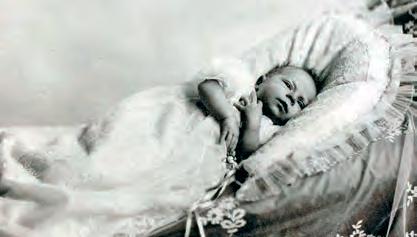
The biggest change, of course, is that the baby will remain the third in line to the throne whatever its gender. The Succession to the Crown Act 2013, which received its Royal Assent in April, abolishes the primacy of sons over older daughters. As a result, it perhaps removes the pressure to produce a male heir that, until now, all queens and future queens have su ered. Queen Victoria, for example, reacted to the birth of her first child, also Victoria, with the words, “Never mind, the next will be a prince.” (The younger Victoria, incidentally, later became the mother of Wilhelm II, Kaiser of Germany during the First World War.) The act also means the child will be the first royal heir since 1689 who can marry a Catholic without being disqualified from the succession.

we take a look at what you can really expect
The first future monarch to be born in a hospital was Prince William in 1982



No—although it’s not as silly a question as it sounds. Until 1948, this was o cial practice with all royal births—to make sure a non-royal wasn’t passed o as the real thing. (Home Secretary Sir William Joynson-Hicks was in close attendance when the present queen was born in 1926.) The fear of such skulduggery seems to date back to James II’s wife, Mary of Modena, whose only son was rumoured to have been smuggled into the royal chamber in a warming pan. Given that James and Mary were Catholics—and soon to be overthrown—the rumour was a useful piece of propaganda.
Despite what you’ll read in the papers, no journalist knows—although traditional names are likely. No Apple (like Chris Martin and Gwyneth Paltrow) or Blue (like Jay-Z and Beyoncé)—especially as this would make the child’s full name Blue Wales.
Again, it’s impossible to say for certain— but this time there are more clues. The traditional location for the baptism of royal heirs is the Music Room of Buckingham Palace, where William (left) was christened. He was dressed in the lace and silk christening robe first worn in 1841 by the future Edward VII —with the Archbishop of Canterbury using the silver-gilt Lily Font commissioned by Victoria in 1840. It seems likely that the newest royal will be baptised in the same way. ■

Singer and songwriter of 1990s band Catatonia, Cerys Matthews presents a popular Sunday-morning show on BBC Radio 6 Music, makes documentaries for Radio 2 and Radio 4, curates festivals and creates playlists for the Tate Modern and Songlines magazine. She’s appeared on The Culture Show and as a singing coach on The Voice UK.
Forms would fill themselves in automatically. I suppose most people hate them—except accountants, perhaps.
Every child would leave primary school able to make soup and sew a pencil case. Of course children must be educated in the core subjects, but I’d add other things to the curriculum like cooking, sewing, woodwork, singing and dancing, so children can find their unique talent. I’d also get rid of bad teachers instantly and put the best ones into positions of responsibility—then let them have a say in the bureaucracy of education.
I’d tax any music tainted by AutoTune. Auto-Tune is pitch-correction software that nowadays is used by at least 90 per cent of recordings—to me, it’s the death of the natural voice. It makes everyone sound the same. Children believe that people actually sing that perfectly, but it’s really the sound of machines. I’d like everyone to appreciate


all di erent types of voices, so any e ects that remove the human input of music would be heavily penalised. If Bob Dylan or Neil Young, with their remarkable ways of singing, were starting out today, they’d find it hard to get airplay.
I’d bring in neighbourhood days and communal barbecue areas. We’ve lost a sense of community in this country, yet it’s so important. Neighbours move in, but we never welcome or get to know them. Distrust and resentment build up over silly things. If I had my way, once a month from May to September
everyone would come together over the barbecue and round a fire with live music and dancing, and have a rousing singalong. People could share their recipes and the old dances and songs that mean so much to them, unlocking memories and bringing everyone in the community together. And because I ruled the world, I could choose a sunny day and let everyone know they could down sticks and not go to work—instead they’d get out there and start the meat roasting.
I’d create a one-click payment system for small businesses. One of the reasons Amazon is so convenient is that you only have to put your credit-card details in once. But if all small businesses got together and used a similar one-click system, it’d be just as easy to support them. I’d tax Amazon properly, but I’d give greater tax relief to small businesses, so they could compete on price too.
Town horticulture would be encouraged. My grandfather lived in a local-authority flat and, nearby on the council land, all along the verges and central reservations, he grew flowers and vegetables. I’d tell councils they must let people do the same so that local children appreciate how vegetables are grown and no land goes to waste. Imaginative use of spare land to make urban market gardens is common practice in Cuba, where people have a share in the profits and eat healthily at the same time.
“Auto-Tune is the death of the natural voice. It makes everyone sound the same”
I’d open swap shops where people bring things they don’t need any more and simply exchange them for something they do. No one wants just to throw away stu when someone else might get lots more use from it, like all those non-biodegradable plastic toys you accumulate when you have kids. The shops would be like a permanent, free car-boot sale.
I’d ensure town planning seeks to bring communities together. Luton is an example of town planning gone wrong and, although I love it because my husband’s from there, it’s very ugly with a high crime rate. Something as simple as putting a road in the wrong place can destroy communities at a stroke and breed gang culture. Much more thought needs to go into bringing people together, not driving them apart.
Everyone would have a real fire in their home, burning special nonpolluting fuel. There’s something about a fire that’s good for the soul. Instead of watching TV every night, you’d curl up in front of it to tell stories or read. It would make our winters a lot easier to bear. ■ As told to Caroline Hutton
Cerys Matthew’s Hook, Line and Singer (£20), a journey through the history of traditional family songs, is out now.
Feeling stuck? A simple change of scene can make all the
They say moving house is stressful, but it’s where you go that holds the key. I’ve recently moved office and I’m in the middle of moving house, but I needed to —in both cases I felt stuck. This month’s Reason to Be Cheerful is simply about finding yourself some new space.
I knew I had to move on if I wanted him to have any semblance of the childhood I’d had, where the greatest thing in the world was to sit in the park and just hang out with your friends.
When I started my business around the kitchen table in that house, there were just two of us. The intention was always to be a kitchen-table digital business,

I loved my last house. I had loads of room, great neighbours, an amazing view over a hundred green gardens, and my little boy had grown up there. And yet I felt increasingly trapped. As my child grew into double figures, I was more and more aware of how isolated he seemed on the days he came to stay—just me, him and the Fifa computer football game. All his school friends were a couple of miles away near his mum’s house and his school. It started nagging at me that no kids ever came and knocked on the door.
where the office lived in our computers, our iPads, our phones. But then two large businesses asked us to help them create content for their projects. Their offices were two streets away from each other in Fitzrovia, London, and the jobs required us to hire staff. So we took the attic room of a mate’s office block.
A year and a half later, we found ourselves with 11 people sitting on each
other’s knees four to a desk, three to a settee. Our little office started to resemble one of those How Many People Can You Get In a Mini world-record attempts
Blue Peter used to do in the Seventies. And so we had to move.
In both cases we didn’t have obvious solutions. The area I was looking at to be nearer my son and his school didn’t have quite as many houses, most of them

spent the last ten years was very difficult to overcome when there didn’t appear to be a better place.
Right up until I found a buyer, I was going over and over in my mind whether I should move or not. I was sitting in the garden one day having this debate in my mind when a couple knocked on the door and told me they’d been looking to live

were a lot smaller than where I lived, and many of them seemed overpriced. Likewise, trying to find an office on commercial terms in London’s West End was madness. We could only afford to sublet from friends again. The office move was a no-brainer space-wise—the challenge was the budget. But the house was a different issue altogether. The emotion that tied me to the property where I’d
in the road for six months. They knew my house was coming on the market and wanted to buy it at any price.
Suddenly, my resistance was being challenged by a nice guy who had the money. The day after we moved, my girlfriend found out she was pregnant. Five months on and we’re renting a cottage a few streets away from my son while the house we’ve found is being renovated.
di erence, as James Brown discovered ►
At work and home, I now feel I have room to live. Both locations have a great view of the future
As we watch my son play football on the nearby green, or as we’re walking past the ponds in the park or popping to the end of the road for a meal, my girlfriend says, “Aren’t you glad you let go and moved on?” And she’s right.
The same goes for my job. Some fairy godfathers who’d given us a lot of work said they had a spare corner of a building they weren’t using, and we were welcome to squat there until they moved out. The space is massive, but it’s encouraged us to grow. With room to sit quietly and a load of empty desks to fill, I’ve found
myself being far more productive. We’ve won a couple of good new accounts and been able to take on new staff.
At work and home, I now feel I have room to live. Both locations have a great view of the future, and if that isn’t a Reason to Be Cheerful, I don’t know what is. n
James, founder of Loaded magazine, now edits Sabotage Times—an online magazine with the motto: “We can’t concentrate, why should you?” Follow James on Twitter @jamesjamesbrown
This creepy little vision was one of thousands of tales submitted to this year’s 100-Word Story Competition.
We’ll be featuring a commended story in the magazine every month.
 By Bethany Bartlett, London
By Bethany Bartlett, London
“She’s not exactly a normal child,” said Mr Jones, smiling hesitantly as he focused on the shiny black buttons on Mr Brooke’s suit.
And indeed, thought Mr Jones, if you wanted a word to describe Lily Brooke, you probably wouldn’t choose “normal”. “Clever”, perhaps, as she was, and he’d heard some girls labelling her as “ugly” after a small green wart had appeared on the end of her nose.
Or maybe “witch”, after the incident with the cats. But Mr Jones was sure that it was all just rumours…
That is until Mr Brooke turned his desk into a snake.
Bethany says: “I was inspired to write this story by the unique mixture of pride and embarrassment I experience every parents’ evening. I enjoy writing pieces that are based on school life with an element of the supernatural incorporated into them, because I can draw upon my own experiences while at the same time asking myself, ‘What if...?’ ”
Bethany will receive a cheque for £50



























Bring your car and sail away to the Isle of Man. Your holiday begins the moment you relax on board, before driving away to explore unspoilt countryside, a stunning coastline, fascinating culture and marvellous heritage attractions. Bring your sense of adventure. Leave with treasured memories.
















 BY BENJI WILSON
BY BENJI WILSON

From Prime Suspect to The Queen, Dame Helen Mirren has never been one to mess with. Now she’s back in RED 2—and she’s armed to the teeth


Her steely-eyed, unforgettable lead in 2006 fi lm The Queen won her an Oscar, and when we speak she’s gearing up for a performance in West End play The Audience, in which she reprises the Elizabeth Windsor role. But despite being known as the “Best Queen Ever”, possibly for good, you could never accuse Dame Helen Mirren of allowing herself to be pigeonholed.
In recent years, she’s done everything from playing Russell Brand’s nanny in the remake of Arthur to a voice-over in Glee. Yet
►
none of her roles has been more surprising than that of ice-cool, gun-toting assassin Victoria in the 2010 film RED.
This superior movie caper about a group of retired secret agents reunited for one more mission also starred John Malkovich, Morgan Freeman and Bruce Willis, and became a sleeper hit. So next month, RED 2 heaves into view, with Helen once again playing the glamorous but pensionable MI6 operative—who this time is helping track down a missing nuclear bomb.
But despite the top-quality cast and Helen’s credentials, she’s not about to pretend that RED 2 is high culture.
“Well, you know, it’s an action movie, without doubt,” says the 67-year-old. “A good, old-fashioned, straight-down-theline action movie.”
But Helen’s been in the business too long to take the art of the big-ticket genre flick lightly. “It’s not actually that straightforward to make a successful one. You’ve got to get the balance right: the right amount of wit, of laughs, of action, of characters—real, interesting characters, not just clichés. You need quite a magical little concoction to make the thing fly rather than just sit there and be ignored. But I think with a bit of genius casting in the first one, and some funny lines, the piece worked…yes, the piece worked. So it was great fun to go back to it.
“The twist obviously is in the title, with RED standing for ‘Retired and Extremely Dangerous’. These are people who were very active in the murky world of special operations and are still looking for a bit of action.”
RED’s success signalled something of

a change in Hollywood. The action movie has never gone out of fashion, but a film starring actors whose main source of action you might have thought would be picking up the remote to turn on Antiques Roadshow is a genre no one saw coming. The film’s impact means that certain more recent movies—such as 65-year-old Arnold Schwarzenegger’s The Last Stand, 66-year-old Sylvester Stallone’s Bullet to the Head, and the trotting-out of Bruce Willis’s John McClane for yet another Die Hard—owe Helen and co a debt.
“It’s the funny thing about the film industry. They’re constantly forgetting about certain huge audiences. They completely forgot about teenage girls for a while; then Titanic came out and made something like £3 billion—basically from teenage girls. Before that, I remember they forgot about [young] kids. In this
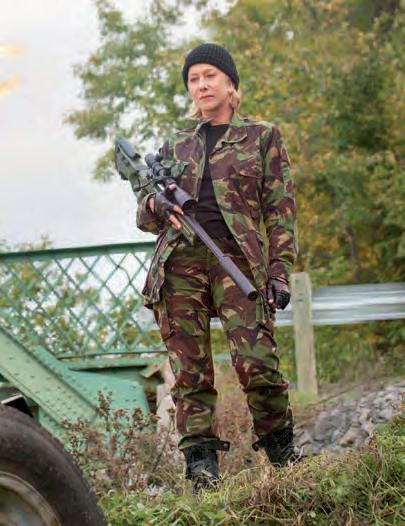




case, they forgot about the baby-boomer generation, which is an awful lot of people who are now in their 50s and 60s, and grew up on the cinema. They’ve got money in their pockets, they’re free of having to go home to look after the children, and they want to go to the movies.”
But, says Helen, though these people want action films, they don’t want trash.
“They’re a pretty discerning audience. They’re not like the male 18- to 25-yearolds who’ll say, ‘Hey, it’s got guns in it,’ or a car chase. The older version of that audience want wit, character development and some kind of vague sense of reality, even if the film’s fantastical.”
Which is why the RED films do so well. Car chases—check, guns—check,

conspiracy theories check , apocalyptic scenarios—check. But it’s all grounded in a believability that comes from a series of brilliant performances from actors of the calibre of Malkovich, Freeman and Mirren.
Indeed, RED 2 adds Anthony Hopkins to the pantheon. This is the second film in a year in which Helen and Hopkins have both appeared—she played his wife in Hitchcock—despite never having done so during the rest of their careers.
“It’s a match made in heaven, if you ask me,” she says. “Yet somehow we’ve always missed working together. And now I get to do two movies with him in one year. Completely coincidental. The incredible thing about Anthony is that
he’s still a real inspi ration. He puts all the height of his incredible expertise, ability, talent and professionalism into anything and eve rything he does. Gene Hackman is someone I really, really admire and he has the same quality. No matter the material, he gives it his highestquality performance. That’s the kind of actor I want to be.”

to, children at home, you know.
With husband, film producer Taylor Hackford, and her two stepsons
It’s odd to hear Dame Helen aspiring to be like another actor, given that most would do anything to emulate her. Equally, it’s a bit strange to see “the Queen” doing high-octane action sequences when we’re so used to her delivering stoic humanity with such aplomb. It seems that, even at 67, RED 2 offered her some screen firsts.
“This is the first time I’ve done a big car chase. It was…very visceral and very exciting,” she says with a girlish giggle.
Yet even when playing a character about as far removed from her own life as it’s possible to imagine, she still tried to stay true to herself.
“I have this big sequence where I walk into an embassy and start shooting. I kept saying to the director, ‘I will not shoot to kill. I want it to be very clear that I’m not killing people! Please, make it very clear!’ So Victoria’s only partially disabling them. I do get terribly upset when I see films where people are just randomly shot. I think they all have families to go
“Victoria’s a trained assassin, but [her shooting] isn’t random —it’s very carefully done. I think of her as a very specific, targeted weapon. That sort of arbitrary killing with automatic weapons is just not her style.
“We were doing the car chase, with a truck that was driving down the road. The truck tipped over and went into a roll. I said, ‘What about the driver of that lorry? He’s an innocent bystander. I can’t be in a sequence where they’re driving along just randomly killing innocent people.’ So they made it quite apparent in the sequence that the lorry lands the right way up. I was fighting a bit of a losing battle, but I was trying my best.”
It’s rather delightful picturing one of the stars of a film that has “Extremely Dangerous” in the title trying to persuade the director to keep minor characters alive on humanitarian grounds. It says much about Helen’s standing in Hollywood that she was able to get her way too. Yet part of what’s made many of her performances so compelling is the sense that, beneath the calm exterior, Helen has some steel, perhaps some danger in her. Does she have more in common with the edgy Victoria than we might realise?
“I was always rather attracted by a
walk on the wild side when I was younger,” she says, somewhat wistfully. She was renowned as a Sixties tearaway, and although she won’t elaborate on precisely what “walking on the wild side” might consist of, we may assume it’s another euphemism for what these days is termed “partying”.
“I think that I’d love to still walk on the wild side, but I’m just too tired. I want to go home, I want to be in bed by 10.30pm. But I guess to a certain extent I’m still sort of attracted by it. In the Sixties and Seventies, there was a weird sort of innocence about it all [the party scene] and maybe that’s gone, I don’t
know. Or maybe it’s still the same and I’m just not out there seeing it.”
Still, when she does want to walk on the wild side, she can always live out her fantasies in the movies.
“I do think the whole thing of being a spy or an undercover person is so much to do with acting—pretending to be someone you’re not. So I think there are parallels somewhere along the line. Although I’ve seen very few actors ever become spies.” She laughs. “Or maybe they do and we don’t know…” ■
RED 2 opens in cinemas nationwide next month.
Wikipedia is the most popular general reference work on the internet (according to its own entry). But although it’s a handy site, we should be wary of trusting it completely—as these erroneous entries prove:
Gardener and broadcaster Alan Titchmarsh has published his own version of the Kama Sutra.



The Duchess of Cornwall’s middle name is “Cow-miller”, while Tony Blair changed his middle name to “Whoop-dee-do”.
Singer–songwriter Janis Joplin “speedwalked everywhere and was afraid of toilets”.
Children’s TV presenter Timmy Mallett is a “former world jet-ski champion”.
Borat, the character created by Sacha Baron Cohen, is the president of Kazakhstan.
Greek philosopher Plato was “an ancient Hawaiian weather man, surfer and writer of [the magazine] CosmoGirl”.
TV presenter Vernon Kay “drowned in a tragic yachting accident in Greece”.
US politician Nancy Pelosi is of Italian descent, and “Italians drink children’s blood”.
Gary Oldman is a British screen and stage actor, filmmaker, musician and “gira e”.
We’re an island nation, but we also have more than 6,000 “extra” isles o our coastline, only about 140 of which are inhabited. So if you’re looking for a remote getaway, there really is something for everyone
BY LOLA BORG









The story goes that Joachim von Ribbentrop, the Nazi foreign minister, came to Cornwall for a weekend in 1937 and decided, come the invasion, he’d bag St Michael’s Mount for himself. Who could blame him? A mini Mont Saint-Michel (and given to their monks after the Norman conquest), it’s a rocky outcrop dominated ►



by its medieval church and castle (and, thanks to some alleged miracles, it’s also a place of pilgrimage).
Owned by the St Aubyn family from 1657, they gave it lock, stock and medieval spire to the National Trust in 1954 in exchange for the rights to run it and call a part of the castle home for 999 years. Earlier this year, Lord St Levan (aka John St Aubyn) died aged 94, after welcoming visitors to the island for more than a quarter of a century. “I’ve often said that my greatest contribution to St Michael’s Mount was to do nothing,” he mused.
There are almost a hundred islands (known as eyots or aits) in the River Thames, including Runnymede, Hayling and D’Oyly Carte Island in Weybridge, bought by Richard D’Oyly Carte of opera fame. Eel Pie is merely a tiny blob in the bend of the Thames at Twickenham, but between 1957 and 1967 it was a magnet for the London music scene. The list of people that performed at the legendary Eel Pie Hotel includes David Bowie, Rod Stewart (performing with Long John Baldry) and scru y unknowns The Rolling Stones, who at one point had a weekly residence.

The island had a reputation for louche behaviour; the hotel later became a hippie commune before it was razed in a fire. Today couldn’t be more of a contrast—quiet, residential, ramshackle and overgrown in summer. The words “desirable residence” ring in the head of the visitor, and you’d be hard pushed to guess its wild history. It’s a private island, so The Fox pub on the opposite bank is a nice place to enjoy a pint on a sunny day.
The best way to experience the island is to walk across the old brick causeway at low tide and climb up the grey stone steps to the summit. (Warning: it’s higher than it looks from the shore.)
As one of the National Trust’s most popular destinations, it’s truly humming in high season, so it’s better to plan a visit for a quieter time.
Reached by ferry from Marazion, or on foot when the tide is out
Privately owned, Eel Pie Island is open to non-residents on artist open days in the summer
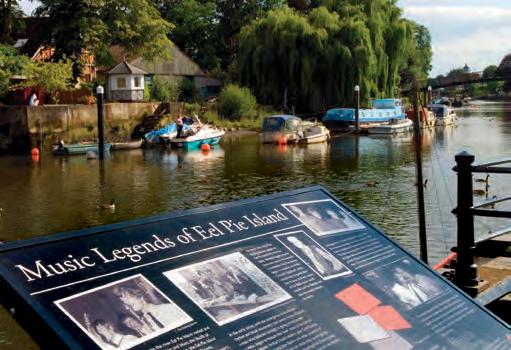


Mull and Iona, Inner Hebrides
Mull, the third largest of the Scottish islands, is teeming with wildlife— otters, whales, dolphins, golden eagles and deer. But the stars must be the enormous sea eagles with their distinctive white-tipped tails (known as flying barn doors), which were once extinct in mainland Scotland.


The most dramatic way to arrive in Mull is by tiny plane, which gives views of the beaches, bays, eagles (if you’re lucky) and the pretty pastel-coloured fishing village of Tobermory (pictured above), which is also the departure point for the whale- and dolphin-watching trips. (You could see fin, minke, long-finned pilot or killer whales and occasionally sperm whales o the waters here, as well
species of dolphin and harbour porpoises.) At the very western tip of Mull is the tiny, mystical island of Iona, home of the famous Christian community who work for peace and social justice. There’s been a religious settlement here since the sixth century.
Be sure to book early for Mull. At the height of summer, it’s a bunfight to find a free bed on the island.
Reached by seaplane from Glasgow (tobermory.co.uk) or by Caledonian MacBrayne ferry from Oban

Isles of Scilly, Cornwall
Always described as a “little bit of the Caribbean o the coast of Cornwall”, Scilly is a string of 145 islands just o Land’s End, though only five are inhabited. They all have their charms, but St Mary’s—the largest at a mere three miles wide—has long been the most famous due to its association with the pipe-pu ng former
Rathlin Island, Northern Ireland


prime minister Harold Wilson, who had a holiday home on the island and is buried here. Wilson was often pictured lolling about on the balmy islands, although papers released after his death reveal that he suspected he was being spied on by Russians disguised as trawlermen while he was there.
Tresco—the second largest island—is famous for the collection of Victorian plant-hunter Augustus Smith in the exotic Tresco Abbey Gardens. The islands are also a lure for those interested in wildlife spotting (whales, basking sharks, dolphins) and wreck-diving.
The Isles of Scilly are 28 miles o the south-west coast of Cornwall. St Mary’s is the most accessible, with a ferry service, airport and helicopter links (islesofscilly-travel.co.uk)
Rathlin is the only inhabited island o the coast of Northern Ireland. The population is hardly a throng at 70 and they’re far outnumbered by the birds—shags, guillemots, razorbills, kittiwakes, fulmars, gannets and pu ns. Some 100,000 birds nest in the cli s and can be viewed from the RSPB bird hide. From midJune, the first chicks are hatching; around the end of this month, the pu ns gather up and head out to sea. Other wildlife includes ravens and buzzards, as well as grey and common seals.
Eight miles long, Rathlin is a popular day trip in summer (admittedly best on a fine day). The scenery is rugged, with velvety green cli s and brisk winds, and as cars are allowed on by special permission only it’s perfect for walkers. On a clear day, you can see over to the Hebridean islands of Islay and Jura.
Rathlin Island, six miles o the coast of Ballycastle, can be reached by ferry (rathlinballycastleferry.com)
Burgh Island, Devon

This is a tidal island, reached by foot at low tide or by tractor the rest of the time. The island (pronounced Burr) is a rocky outcrop that became popular as a picnic destination for Victorians, but it’s now famous for its restored art-deco hotel. The owners can reel o a list of famous guests—Agatha Christie (who wrote And Then There Were None and Evil Under the Sun in the hotel’s Beach House), Noel Coward, and Churchill
and Eisenhower, who met here before the D-Day landings.
The dinners are black tie and visitors often dress in 1930s costume. Slightly less formal, The Pilchard Inn is an old smugglers’ pub, dating from 1395. Burgh is not the cheeriest place in the winter months, but it gets pretty full come summer—best to go for just slightly out of season.
Located 400 yards south of Bigbury-on-Sea ►





There are many claimants for the title Holy Island, but Lindisfarne —the small and atmospheric tidal island just o the coast of Northumberland—wins by a nose. Birthplace to the Lindisfarne Gospels some 1,300 years ago (now in the British Museum), home of Saint Cuthbert and an early centre for Christianity, its entire early monastic civilisation was wiped out by pesky Viking raiders. It’s been a draw for pilgrims ever since; on Good Friday they plod across the muddy flats, often carrying crosses (pictured above).

The ruined and eerie Lindisfarne Priory is probably the most famous image of the island (and a good place to start a tour); Edwin Lutyens restored the castle in 1901, and it has a walled kitchen garden (best seen in summer months) designed by his
friend Gertrude Jekyll. The island is also famous for wildlife—there are 25 varieties of birds here and honking grey seals are plentiful. Then there’s Lindisfarne mead, first made by the monks (don’t ask us why monks always brewed up a storm) and still produced here in the island winery. Lindisfarne is one mile o the coast.
Visitors can pick up a bus, minibus or cab shuttle from Beal. Check national trust.org.uk for safe crossing times
Anglesey, Wales
Of course Anglesey is a lovely island—the largest o the Welsh coast, huge and flat with wide beaches, and 125 miles of coastal path for serious walkers. Oh, and it has the longest place name in Britain (shortened to Llanfairpwllgwyngyll). But its recent popularity boom has nothing to do with its charms and everything to do with tourists hoping to bump trolleys in the local Waitrose with its most famous residents.
Kate Middleton and Prince William scurried straight back to their rented house in Anglesey near William’s RAF base after the royal wedding, and a stream of tourists have followed them (it’s been dubbed by the press as “Wills and Kate’s Island of Love”). Where they actually live is classified information, obviously, but they’ve been spotted having a drink at the White Eagle pub in Rhoscolyn.
Reached by road over the Menai Straits via the Menai Suspension Bridge or the Britannia Bridge
Rockall, Scotland
This island partly owes its fame to the shipping forecast, and you may think it exists only in the imaginations of BBC Radio 4 listeners. The real Rockall, however, is an uninhabitable lump in the Atlantic some 70 feet high. It’s been described as the “most isolated speck of rock in the world” and one of the most dangerous—the Rockall Club is only open to those who have landed on it (less than 100 people, it seems). There were ownership


squabbles with Ireland, Iceland and Denmark for years, but it was bagged by the UK in 1972. It supports only a few life forms (molluscs mostly), but it’s good for dolphinspotting. Perhaps not the best holiday destination.
Rockall is 184 miles west of St Kilda, the nearest island. According to the Rockall Club (therockallclub.org), access is possible by private boat. Companies operate from Leverburgh and Stornoway in the Western Isles. ■
With thanks to: Jon Williams, National Heritage Lottery Fund; Wendy Necar, Sea Watch Communications; Wendy Johnson, RSPB; the National Trust; Lara Dunn, travel writer; and Tim Taylor, travel adviser.
Got a favourite island we haven’t mentioned? We’d love to hear about it, so send us an email—with a picture if possible —to theeditor@ readersdigest.co.uk.
For more about Britain’s islands, see our web article at readersdigest. co.uk/magazine.
As this fabulous but flawed institution reaches pensionable age, we ask four independent experts how they’d improve it
 BY DANNY SCOTT
BY DANNY SCOTT
SIR GERRY ROBINSON, businessman, presenter and former Granada chairman
“In the time I spent working inside the NHS for the [2007] series Can Gerry Robinson Fix the NHS?, I realised that while it almost always works as it should when it comes to life-or-death situations, there’s a big problem with its structure.
“In other large organisations such as Tesco or Sainsbury’s, you have tried-and-tested systems where people are accountable from the centre to the tips. Yes, the NHS is more complicated than a supermarket, but we’ve got it into our heads that the NHS is unmanageable and it’s not. I’m not talking about medical diagnosis; I’m talking about







Can

basic stuff like finding out which departments are performing well and which aren’t. I don’t need to mention what happened at Mid Staffs.
“Fixing that won’t eliminate every mistake, but at least you’ll find those errors and can then say, ‘This isn’t good enough!’ If people don’t improve their performance, you certainly don’t let them stay in a position where they can do any harm.
“I was also told about an NHS list of 35 ways to keep a surface clean. Simplify it! Management isn’t about producing lists and ticking boxes— it’s about motivation. I’ve seen people get excited about making biscuits, so surely you can make your staff feel good about saving lives.
“But implementing such ideas is almost impossible in an organisation made up of separate trusts around the country. I think we need to go back to go forward. Let’s join all those bits together in a streamlined, centralised health service. Yes, there’d be room for privatisation—in areas like diagnostics or the odd, smaller hospital—but this would be a nationally run service.
“Things will still go wrong, but that shouldn’t be used by the media or politicians to say the whole system
British inventors are developing innovative products to combat some of the biggest “little” problems in healthcare
By Jo Carlowe
Developed by Maja Kecman of the Royal College of Art’s Helen Hamlyn Centre for Design, these disposable table placings imprinted with essential facts for patients were recently introduced in several hospitals.
“The mats are excellent,” says Carol Cato-Duncan, senior sister of an acute medical ward at Imperial College Hospital in London, who uses them to record the name of the on-duty nurse and changeover times. Mats may also detail that day’s visiting hours, meals or medical information about a person’s condition. “Some 80 per cent of our patients are on cardiac monitors, so they can’t get up and start reading patient pamphlets. But with this in front of them, we’re able to keep them informed.”
Weight loss is one of the most commonly reported problems for people with dementia. In the early stages, depression may cause loss of appetite, while a person with advanced dementia can fail to recognise the purpose of food or drink.
Scent expert Lizzie Ostrom of The Olfactory Experience knew smell could stimulate appetite and teamed up with Ben Davies of Rodd Design. They developed Ode, a scent clock that releases an appropriate food scent an hour before the required mealtime.

test patient, who weighed less than six-and-a-half stone, put on almost half a stone in two weeks.
Kevin, an elderly man from Southampton who’d lost all interest in food, suddenly got his hunger back when testing the device. “He was coming into the kitchen and asking when lunch would be ready. This has never happened before,” says his full-time care manager Martin. Another
This selfcontained bed unit has a patientcontrolled modesty screen that removes the need for a flimsy curtain. It also has low-level lighting at the edge of the bed to guide patients getting up during the night, without disturbing others. Most impressively, the pod has a curved metal bedhead and ceiling canopy that redirects sound waves onto the bed
Earlier this year, the Ode team completed a second stage of testing— in specialist care homes and at the Royal Hospital Chelsea, home to the Chelsea Pensioners—and have recently introduced Ode in a small number of other care homes across the country. Visit myode.org.



rather than across the room, cutting conversation volume by as much as 20 decibels.
“Patients may be reluctant to share all their
symptoms with a doctor if they can be overheard,” explains designer Caroline Paradise of Nightingale Associates.
symptoms with a doctor if they can be designer Associates.
Bed Pod is being tested this summer at King’s College Hospital, London, and Hull and East Yorkshire NHS Trust. If successful, it could be available in other hospitals by the end of the year.
“ONCE YOU PUT BEING A GRADUATE ABOVE HAVING THE RIGHT TEMPERAMENT FOR A JOB LIKE NURSING, YOU’RE LOSING THE PLOT”
DAVID BLUNKETT

doesn’t work. In fact, when mistakes happen in a logically run organisation, they’re picked up and put right.”
DAVID BLUNKETT, Labour MP, former home secretary and shadow health secretary“So many of the NHS’s problems can be summed up in one word: caring. I’m not trying to lay the blame for this situation with any one political party, because it goes back almost 50 years. But since the 1960s, there’s been a shift of emphasis to elevate things like management and qualifications above patience, empathy and the desire to care for someone.
“It’s ridiculous that we should be even discussing this, but we know that it’s happening—patients aren’t being given water, food is being left out of reach, incontinence pads aren’t being changed. Once you put being a graduate above having the right temperament for a job like nursing, you’re losing the plot.
“Yes, it’s helpful if a young person coming into nursing or health has a degree and they’re looking to progress into management, but the starting point must be recruiting people who’ll go the extra mile when it comes to looking after patients.
“We need a pathway that allows caring people to be rewarded—not just in financial terms, but also in status. We [Labour] introduced a similar idea in education some years ago with the Advanced Skills Teacher. It was a method of advancing good people who wanted to carry on teaching in the classroom, instead of applying to be a head of department or deputy head.
“There are many jobs in this life where, even if you don’t like what you do, you can muddle through. But that doesn’t work with teaching and it doesn’t work with the vast majority of jobs in the NHS. If a person isn’t emotionally right for that job, they shouldn’t be there.”

Can’t quitehear your wife or husband, the TV, colleagues at work, or the loving words of your grandchildren?
Then these spectacle hearing aids could be the answer if you havea hearing problem.
Stylish frames that cleverly contain and disguise a digital hearing aid in the spectacle arms slip easily into your pocket, purse or handbag.They are a remarkable invention that overcomes two problems at once.
While most people are not bothered by wearing glasses, the same cannot be said for
wearing a hearing aid. These specs are brilliant because you wouldn’t think they are a hearing aid.
Some people can find it uncomfortableand unnaturalto have a hearing aid in their ear but that’s not a problem with these as there’s nothing in the ear to irritate you.
So if you want to have clear vision and quickly improve your hearing, apply now for a free information pack by sending the freepost coupon or by calling the number below.


“The care we receive is becoming ever more complicated and personalised. If you’re a cancer patient, you might see three doctors, a couple of specialist nurses, a physio, a radiologist…a huge group of people without any overall chain of command. The only thing that holds them together is you, the patient. But you’re the only person who’s not invited to be part of the team.
“It’s crucial that patients have access to all the information the doctors have and that their opinion isn’t dismissed as interference. When someone is mistreated or mistakes are made, it’s often very simple things like forgetting to send them for a crucial test or not providing the correct prescription. Who’s the one person most likely to realise such an error has been made? The patient!
“This role wouldn’t be appropriate for every illness, and some patients —such as the elderly—just want the doctor to do his or her job. But as demands on the NHS grow, surely the resource we can still call on is…us.”

“The NHS was designed to tackle specific issues, such as a broken leg or childbirth. But as we live longer, we’re often suffering and dying from multiple problems. It could be anything from a heart condition and arthritis to hearing loss and breathing difficulties.
“At present, you might see the heart team for your heart, the ENT team for your hearing and so on. But if all the issues are treated separately in different hospitals and even cities, there’s a danger that the patient won’t get joined-up care, especially if he or she’s 85 with no one to speak up for him or her. The heart problem gets fixed, but the hearing is missed. The patient is sent home, but falls over because the ear problem is affecting balance—and we’re back in hospital with a broken hip.
“Yes, ‘joined-up care’ costs time and money, but how much does a broken hip cost? If we manage the health of older people properly, we’re going to keep them out of hospital and out of care homes. All of that saves cash for the health service and means a person lives a much, much happier life.” n
According to Transport for London, nearly 72,000 items were accidentally left on the Tube last year. Along with the usual Oyster cards and umbrellas, articles handed into Lost Property have included:
False teeth, a bag of human skulls, breast implants, crutches, single shoes, prosthetic limbs, a lawnmower, a phial of bull sperm, a park bench, WWII gas masks, a home vasectomy kit, a grandfather clock, a stu ed fox…and a stu ed pu er fish.

When travelling abroad, the local food, drink and climate can all have an effect on the balance of bacteria in your digestive system.
Bimuno® TRAVELAID is a unique and convenient formulation that has been specially developed for business and holiday travellers, to be taken in preparation for and during your time abroad.
Published scientific studies* have shown that some prebiotic Galacto-oligosaccharides, such as provided by Bimuno TRAVELAID, can help encourage and sustain a healthy level of your ‘good’ gut bacteria.
Next time you’re going away try Bimuno TRAVELAID soft chewy pastilles to experience the benefits for yourself.
Visit Bimuno.com for more information.
For the latest news and offers follow us on
Now available from
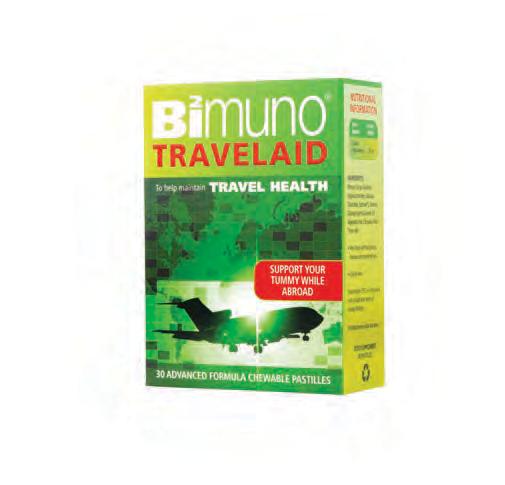
*Studies on file. Bimuno TRAVELAID is the result of nine years of intensive scientific research with the University of Reading. Bimuno is a food supplement. Food supplements are intended to supplement your diet and should not be regarded as a substitute for a varied diet and a healthy lifestyle. Bimuno® is a registered trademark which is the property of Clasado Inc for a Prebiotic Transgalactooligosaccharide.

Fifteen minutes before, a young paraglider had been soaring over some of Europe’s most beautiful scenery. Now he was fighting for his life

As he floated high in the sky, Simon Vogrinec marvelled at one of the most breathtaking views in Europe. From the harness of his paraglider, he could see over successive ranges of blue-grey hills to the mountains that lie between BosniaHerzegovina and Montenegro.
It was a fine, clear October day. But already there was a chill in the air that hinted at the approach of winter. Simon was doing what he loved most: “When I’m paragliding, I like the silence in the air, where the only thing you hear is the wind in your hair.”
After ten to 15 minutes, he landed on a steep, grassy slope under the peak of Mount Jahorina. He gathered up the sail-like wing, threw it over his shoulder and began walking towards his cousin Uroš, who’d landed before him, a little higher up.
Above them, close to the peak, Simon’s older brother Boštjan was preparing to follow him into the air. “I had the cords in my hands, but just as I was about to take off, I heard a loud bang,” Boštjan says. “Then I saw a huge black cloud.”
Simon, a tall, muscular 28-year-old, had been thrown to the ground by the blast. Then he began screaming. “I stepped on a mine! I stepped on a mine!” From where he was lying, he watched as Uroš, 30 yards away, instinctively rushed towards him—only to pull up sharp as he realised that he was careering into a minefield.
In the midst of doing
what he loved best, Simon had unwittingly conjured up one of the many lurking ghosts of Bosnia’s terrible war of the early 1990s. And now he and his friends were trapped in a place where one false move could mean agonising death.
The three men were among five young Slovenian paragliders who’d arrived in Bosnia the day before and been taken flying by the director of the local paragliding school. They’d gone by themselves to Jahorina, whose magnificent slopes were used for skiing events in the 1984 Winter Olympics.
There’s a take-off point for paragliders on the south face of the mountain, but they found the wind was blowing in the wrong direction. So they set off for the other side, unaware that they were heading into mortal danger.
There had been a radar station at the top of the mountain, and to protect it during the war, Serbian forces had placed landmines on the northern slopes. When the fighting stopped, nobody put up warning signs—even though such signs are a feature of the region, much of which had been heavily mined.
HE AND HIS FRIENDS WERE TRAPPED IN A PLACE WHERE ONE FALSE MOVE COULD MEAN AGONISING DEATH
“We had seen people picking cranberries, so we thought it was safe,” says Simon.
It’s believed that he set off one of the deadliest mines of all—a “bounding mine”, one that springs from the earth and explodes at waist height, usually killing anyone within 35 yards. He was almost

certainly saved from instant death by the layer of wood and foam beneath his paraglider’s seat, which he was still wearing when the mine went off.
As the acrid smoke from the explosion began to clear, Simon found himself lying face up with his feet pointing down the slope. He lay blinking at the patch of sky in which he’d been floating so happily just minutes earlier and realised to his surprise that he was not in that much pain. He told himself to stay calm.
“I knew that I was very seriously injured and that I had to do everything possible to pull through,” he says.
As a psychiatric nurse, Simon was well used to coping with emergencies involving other people. He has an unflappable, almost lugubrious manner.
“I decided that I had to assess the damage, and I could see my feet had been blown off at the ankles. They were
connected, but only by tendons. I had no control over my right arm below the elbow, which had been trashed.”
Yet remarkably—and, as it turned out, crucially—he could move his right wrist.
“I knew that I had to stop losing blood,” he says. That meant putting on a tourniquet. He used the suspension lines of his paraglider.
“I didn’t have the strength to tie the cord around each of my legs. But I did find a way to tie both legs together: I pulled the cord under my legs with my left hand, and then threw my right hand over my body, so I could use my right wrist to help tie the cord above my knees.”
Next, Simon set about taking advantage of the slope, so the blood seeping out of his shattered legs would run to his head instead. Agonisingly, and with the everpresent risk that his movements could set off another mine, he turned himself round until his legs pointed up the hill.
Boštjan, a policeman, had taken the precaution of putting the number of the local police into his mobile phone. He rang them and then called Mirvad Zenuni, the head of the paragliding school, who began desperately ringing anyone he thought could help. He soon discovered that Bosnia’s complex politics were going to stand in the way of a rescue.
Bosnia is divided into two halves: one controlled by ethnic Serbs and known as Republika Srpska; the other, the Federation of Bosnia and Herzegovina, consisting of ethnic Croats and predominantly Muslim Bosniaks. The Federal mountain rescue team told Zenuni they could not intervene, because each side did sevenday shifts and it was Republika Srpska’s turn to be on duty.
But Republika Srpska is itself split into two and its rescue helicopter was in the northern half—too far away from where Simon was in danger of bleeding to death.
Eventually, one of Zenuni’s pupils remembered that he had the phone number
of a Slovenian diplomat in the Bosnian capital of Sarajevo. He called her and handed the telephone to Zenuni who suggested the embassy ask for help from EUFOR, the European Union’s rapid reaction force near Sarajevo, which enforces the peace agreement that ended the war.
Back on the mountainside, Simon’s condition was deteriorating. “The serious pain started about 45 minutes after the explosion,” he says. He had a handheld, two-way VHF radio, as did his companions, now spread across the mountainside, who used theirs to try to keep his spirits up. But, as the minutes ticked away and the pain increased, there were ever longer silences from Simon. One silence lasted for so long that another cousin, Jani, thought he’d died. But then they heard him cry out in agony. “At that moment, it was the sweetest sound,” says Jani.
“After an hour, I was beginning to wonder if I would make it at all,” remembers Simon. “With every minute that passed, I felt less confident that I would be rescued.”


In fact, alerted by the police—and after some delay—the area’s head of civil defence was putting together a team to respond to the emergency. It included a mountain rescue unit, police, a doctor, a nurse and a demining team. But it was Sunday, and the people he needed were scattered far and wide.
By the time the rescuers got to the top of the mountain, the light was fading and mist was descending. Then Simon got a message that gave him hope.
“One of our guys who was in contact with the rescue team told me to remove the cord around my legs. He said that a helicopter was about to arrive and they wouldn’t be able to lift me with the cord still on.”
In the distance, Simon heard the sound of rotary blades clattering. It grew louder, and he felt sure that he was about to be saved. Two helicopters, sent by EUFOR, had reached the area.
But then the helicopter crews judged the risk too great that their winchman could set off a mine. Simon laboriously retied the knot around his legs. The only solution now was for the mountain rescue team, waiting on the edge of the minefield, to go in on foot. First, though, the deminers would have to clear a path.
brother over the radio. “I was telling him just to hang in—that rescuers really were coming now.” It was vital Simon should not lose consciousness.
As the waves of pain swept through his body, he dug his hands into the earth with as much strength as he could muster, trying desperately to stay conscious.
The deminers were no more than 50 per cent sure that the path was clear and told the rescue team to step as much as possible on rock. But it was now dark and it had taken the team almost an hour after the helicopter rescue had been abandoned to reach Simon. By then, he was only partially conscious and talking incoherently. But, he says, “I knew I had been saved, and a huge burden fell from my heart.”
AS THE WAVES OF PAIN SWEPT THROUGH HIS BODY, HE TRIED DESPERATELY TO STAY CONSCIOUS
Simon watched as—step by perilous, tentative step—deminers, just 100 yards away with rods and metal detectors, edged towards him in the growing gloom. They found one mine directly in their path and decided to go around it.
Simon was starting to feel wildly dizzy. Dots swam in front of his eyes. “By that point,” he says, “the pain was constant— and sometimes unbearable.” To keep himself from fainting, he thought about his girlfriend Mojca.
Boštjan, meanwhile, kept talking to his
But S imon’s life wasn’t saved yet. He was taken to hospital in Sarajevo, where the next day in intensive care, his blood pressure was down, his pulse was up, and there was a growing risk that his kidneys and heart would fail. The doctor asked Boštjan for permission to amputate his brother’s legs. Immediately.
Three days after the explosion, Simon came round in the early hours of the morning. “The first thing I wanted to know was if I had my legs. I was too weak to see for myself. The nurse said that I would have to wait to see the doctor.”
Desperate to know, he kept talking to her. The nurse told Simon she could ►

lose her job. But he kept up the pressure and, finally, she approached the bed.
“She didn’t say a thing. She just pulled back the sheet. What I saw was the worst thing of all. Nothing was as difficult— neither the waiting, nor the pain. Nothing was as difficult as having to face that sight. But I was alive. And that really is something to be thankful for.”
Some 20 months later, Simon is
determined to paraglide again. A campaign to buy him “thinking” legs—electronic prosthetics that read the motion of his body—has reached 90 per cent of its target. The hospital where he worked has agreed he can return to work, and his relationship with Mojca has strengthened. “We don’t fight over small things,” she says, “because there is this other, much bigger thing.” n
I took this at the JFK memorial at Arlington cemetery in Virginia. Proof that health and safety extends across the Atlantic. Thanks to Vince Pol from London for sending this in Be Prepared

Every year thousands of people put their faith and trust in Cats Protection when looking for a new addition to the family.
Behind each volunteer and member of staff is a wealth of experience and expertise which means when you adopt one of our cats, you can feel safe in the knowledge that he has been given the best possible care.
When he leaves Cats Protection, your cat will have been treated to a top-to-tail medical.
This means he will have been:
• Fully examined by a veterinary surgeon
• Vaccinated at least once against flu and enteritis
• Treated against fleas, roundworm and tapeworm
• Neutered if old enough
• Microchipped

We also provide four weeks’ free insurance (terms and conditions apply) giving invaluable peace of mind and reassurance as you and your cat embark upon this lifelong friendship.
All he needs now is a loving home to make his dreams come true – over to you!

Find a Cats Protection cat looking for a home in your area. Simply scan the QR code with your smart-phone to use our new find-a-cat search tool, or get in touch on the details below. Thank you.
T: 03000 12 12 12
E: helpline@cats.org.uk
W: www.cats.org.uk
Reg Charity 203644 (England and Wales) and SC037711 (Scotland)


…STANDING IN MY GARDEN WATCHING THE AIR DISPLAY FOR CHURCHILL’S FUNERAL. It was 1965, I was three and we lived in a vicarage on the Isle of Dogs. A group of four fighters —Lightnings, I expect—flew down really

low in formation over our heads, because we were just next to the river. It must have been quite traumatic, because I’m not aware of anything at all before that point.
…MY DAD JOHN WAS A VICAR, BUT MY UPBRINGING WASN’T STRICT. He served in east London [later becoming the Bishop of Knaresborough in Yorkshire] until I was ten. We went to church, but it wasn’t the kind of family where we were really well behaved and prayed a lot.
My older brother Ian and I fought sometimes, but we ended up friends. Ian wasn’t interested in sport, but I spent a lot of time doing keepy-uppies with a football. In fact, I don’t have many memories that aren’t playing football. I set fire to things... normal boy stu . There was an old bomb site nearby, which I spent hours on, around bits of wreckage and probably unexploded bombs. Quite dangerous, I imagine.
…THE VICARAGE WAS A GREAT PLACE TO GROW UP IN (ESPECIALLY IF YOU LIKED AMPHIBIANS). It was a huge Victorian house, by far the largest on the Isle of Dogs. It had three bathrooms, which—considering everybody else in the area was living in prefabs—seemed a bit wrong, somehow. One bathroom wasn’t used, so my brother and I kept newts in it. Mum had no objections; being a nurseryschool teacher, she had a good sense of play. One of her pupils—I’ve always liked this—was the daughter of the Kray twins’ getaway driver. Proper East End!
…THE MAIN LESSON MY PARENTS
TAUGHT ME WAS THAT PEOPLE ARE JUST PEOPLE. That’s the thing about vicarages—you’re sharing them with all





sorts of individuals. There’s no status. This was a time when there were still proper tramps—people who just walked around houses asking for a cup of tea. You’d often come home after school and find somebody sitting in the kitchen, having a sandwich and telling his life story. That seemed completely normal.
Apparently, tramps used to have a code where they’d leave chalk marks outside places they’d visited, which meant, “Don’t bother coming here, they’re horrible,” or, “These people will give you a cup of tea.” I think there would’ve been one outside our place saying, “Nice sandwich.”
…SHUNNING BOOKS. We had a record player and Radio 4 was always on at breakfast. We’d listen to the charts and watch Top of the Pops. Weirdly, though, given that I write and words are my life, I really didn’t read. I loved Tintin books, but they were half comics. They were a perfect length to take into the bath, though. Almost always 60 pages, and you could finish a whole book while you soaked.
I think my mum used to despair slightly, because my brother was bookish and academic. I thought, Well, if he’s going to be like that, then I’m not. It wasn’t until about 13 that I began to think books were actually all right.
There was never any pressure from my parents. But both of them had been to Cambridge, my brother was at Cambridge, my uncle had been at Cambridge…and two of my grandparents had been o ered places at Cambridge. It wasn’t that anyone tried to make my mind up for me; it was probably just the only place I’d ever heard of.

As a schoolboy and (right) with comedy partner Steve Punt
I went with a really old mate from school. I can’t remember why he wanted to do it; probably girls. But we took a sketch along and someone laughed, and that was sort of it.
NIGHT. The Comedy Store [in London] was quite a scary place. At Cambridge, you’d have a guaranteed audience that was quite gentle. But in the early Eighties, comedy was changing—Ben Elton and The Young Ones were starting. It had become a di erent beast. Suddenly,
“In the Eighties, comedy became a different beast. We were scared”
appearing on stage and saying, “I’ve just come down from Cambridge”…well, it’s not going to help you in any sense, is it?
Steve [Punt, Hugh’s long-term comedy partner and co-star on Radio 4’s The Now Show] and I were scared, so we developed what we thought was an unhecklable set, where Steve narrated a story and I brought a bag of hats and played all the characters. We went so fast that there was no time for interruptions. It worked, and we did that set for three or four years.
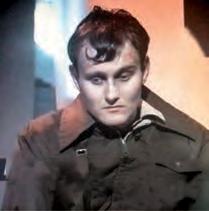
THEN GETTING BORED. We did two series on BBC2, but for two years before that we’d done 43 shows on Radio 1. At the end, in 1992, we’d had enough.
As “MiIky Milky” in The Mary Whitehouse Experience ►
I think Dave [Baddiel] and Rob [Newman] had been o ered something called
WHEN I’M DOING LOTS. It took six years of performing comedy alongside my day job for me to go, “Do you know what, maybe I should try doing this full-time.” I’d been on television for four years [Hugh worked on Jasper Carrott’s Saturday night TV shows] before I decided that. I think it’s just because I like being busy! It was a bit knackering, though.
When I did Spitting Image [1989–1991], working with Steve Coogan and people who knew precisely where they were going, I thought, I really don’t. I have no idea where I’m headed. I used to think it was a terrible weakness, but now I just think that’s who I am and what makes me happy. I dive o in lots of directions.



◄
“The BBC supposedly didn’t understand what Outnumbered would be”
Newman and Baddiel in Pieces, and me and Steve had been o ered a BBC1 show. We just thought, Let’s go and do that, then
...COUNTERING SCEPTICISM ABOUT OUTNUMBERED IN ITS EARLY DAYS.
The BBC supposedly didn’t understand what the series would be. When the production company Hat Trick took them a sheet of paper saying, “It’s a sitcom, there’s a mum and dad and three kids, and they’re outnumbered,” they kind of went, “Mmm. It sounds a bit like things we’ve had before. Would you make a little taster?”
So Hat Trick made a ten-minute version and, for some reason I’m still not entirely clear about, I was asked to do it. In the producer’s house that Saturday, I just thought, This feels really new and fresh.
...TAKING INSPIRATION FROM OTHERS. I’ve learned a huge amount from Claire Skinner, my pretend wife,
Hugh, TV wife Claire Skinner and the Outnumbered kids; (inset) with his real wife Catherine
because she’s so naturally good. I spend a lot of time thinking, I’ve got to make my reactions as small and significant as that. I also have a deep admiration for Stephen Fry, because he makes no distinction at all between highbrow and lowbrow. He thinks Shooting Stars is as important as King Lear
...ENJOYING THE TRAPPINGS OF FAME, THEN HAVING KIDS. We [Hugh and his wife Catherine Abbot-Anderson] lived in Islington, ate out a lot and went on a lot of quite groovy holidays. I always wanted kids, and I was about 35 by the time I had them. But for the first five years of their life, you just disappear. People probably think you’ve died; you don’t go to the cinema, you don’t go out…suddenly we were going on holiday to Devon.
...HAVING ONE OF THOSE “THIS IS
MY LIFE IS” MOMENTS. Before we had kids, we had a VW sports car. We got rid of it when Freddie [the older of Hugh’s two kids, now 15] arrived, and I thought, We can’t get an estate car. We can’t! So I went out and bought a BMW from the 3 Touring series. It didn’t call itself an estate car, which made me feel better.
But it still wasn’t big enough. So I was then forced to get a roof box from Halfords. We also had cats at this point. So one very sunny day, I was driving along the King’s Road, admiring the people walking by—some quite attractive girls—and I caught sight of myself in a shop window: a very tiredlooking 35-year-old man in an estate car with a roof box and a cat-guard. What
you are in your head, and what you actually are, are very di erent things!

BACKWARDS. As I’ve never thought, I’ll do that, then this, then I’ll be a household name and it just happens, I’m always trying to look on life as another fun surprise. Whatever it throws at you, you deal with it and think, Oh, interesting. I’m glad I’m here.
On the occasions when I’ve thought I could possibly be feeling depressed, I’ve just thought, Ooh, I’ll have a biscuit. And then I feel much better. ■
As told to Ellie Rose
Hugh’s new book Britty Britty Bang Bang (£12.99) is out now.
The Metro newspaper’s “Rush-Hour Crush” column aims to unite lovestruck souls who’ve clocked each other on the morning commute. But for every success (including an engagement this year), there are failures—as documented at rushhourcrush.tumblr.com:

I see you every day reading your Kindle on the metro from Tynemouth. I heard you tell your friend that you’re reading Black Tie White Noise, and now that I’m also reading it, maybe we could discuss it over co ee sometime? The boy in the red braces who moves seats to see you every morning
Dear boy in the red braces who moves seats to see me every morning, Yes, I’ve noticed you too. Not only do you wear those horrific red braces, but you also move seats to see me every morning. Just because you eavesdrop on my conversations, that doesn’t make us in any way compatible. With that logic, you should probably marry the automated female voice that announces the stations on the Underground. Kind regards. The girl who pretends to read a Kindle in order to avoid eye contact with you


 BY CRISPIN ANDREWS
BY CRISPIN ANDREWS
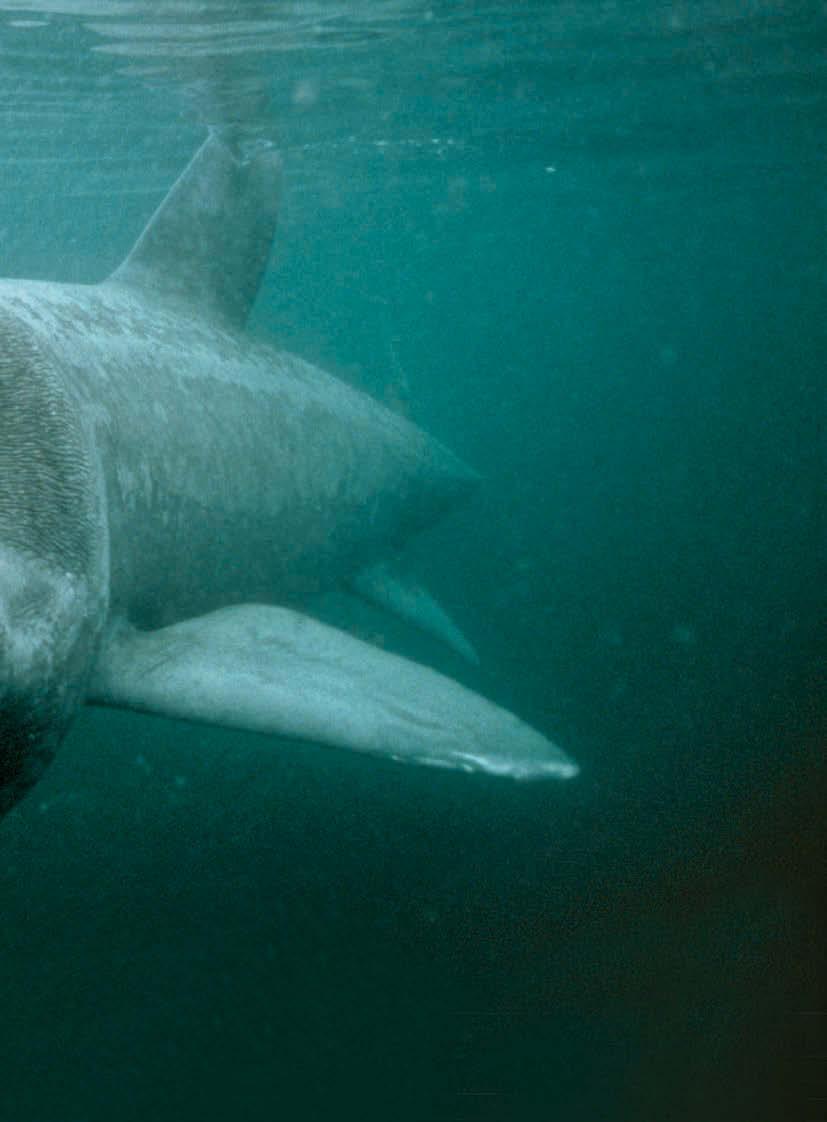
Pollution, hunting, loss of habitat…with 470 species dying out in the last 200 years, the prospects often seem bleak for Britain’s wildlife. But many animals are making an amazing comeback

Whenever someone spots a shark in British waters, it always seems to be a man-eating giant by the time they describe it in the pub. The not-so-threatening eight-foot porbeagle is a more likely suspect. But there is a shark, which has long been visiting our coast, that’s a genuine monster.
The 25-foot basking shark, the world’s second-largest fi sh behind the whale shark, comes to Britain between May and October and, ►
despite its huge, gaping and terrifying jaws, it’s here to eat plankton rather than tourists. But, by the mid-Nineties, the number of sightings had dropped to a worrying 500 or so a year.
During the last century, fishermen caught more than 100,000 basking sharks in the North Atlantic, the Cornwall Wildlife Trust estimates. They hunted the fish for its fins and leathery hide, but most of all for its huge liver, which makes up to 25 per cent of the shark’s body weight and is full of hundreds of gallons

study also found that more people are reporting medium and large animals. “That usually means older sharks—a good indicator that an over-exploited fish is recovering,” says Peter Richardson from the Marine Conservation Society.
Still, basking sharks are migratory creatures and they don’t get the same protection in other countries. So conservationists Graham and Jackie Hall of the voluntary group Manx Basking Shark Watch have been tagging them around

of oil, which was once used in lamps and to make cosmetics.
But commercial basking-shark fishing was banned in British waters in 1998, and it seems to have helped. Last year, a report published by the Marine Conservation Society, Exeter University and the Cornwall Wildlife Trust found that in 2006 alone there were more than 5,000 sightings. Last year, people spotted the sharks everywhere from Bury Holmes in South Wales to Land’s End to the Hebrides. The









the Isle of Man to learn more. The pair take a boat and wait in known shark hot spots, sometimes for hours. When a shark finally shows up, they run the boat alongside it and attach a tag to its fin. So far, the fish have turned up in the Canary Islands and off the west coast of Africa.
“With accurate information about migration patterns, we can approach conservation groups and governments about managing their marine environment to protect them,” says Graham.
For the last two decades, conservationist Johnny Birks has been a PR man with a difference. Since 1993, the Warwickshirebased conservationist has been Britain’s leading advocate for the much-maligned polecat—and helped it make a comeback from the brink of extinction.
By 1900, hundreds of years of persecution had driven the ferret’s wild ancestor from locations all over Britain into colonies in the furthest corners of Wales.
“Polecats were the most-hated British

and Countryside Act made killing a polecat illegal without a licence. But the animal, slightly bigger than a pine marten with a white stripe across its face, still needed conservationists’ help if it was going to make a real recovery.
So when national charity the Vincent Wildlife Trust put Johnny on the case, he set about convincing people, particularly farmers, that polecats weren’t a threat to them.
People had long believed polecats took

mammal as far back as the Middle Ages,” says Johnny. Farmers and gamekeepers killed them, believing they attacked poultry and other birds, while hunters would trap them for their fur.
But by the early 1980s, the polecat had recolonised small parts of western England and the Midlands. Many shooting estates had closed since the end of the First World War—a large chunk of the 18,000 gamekeepers employed in 1914 were lost in battle—and the 1981 Wildlife




“POLECATS WERE ONCE THE MOSTHATED BRITISH MAMMAL”






chickens—hence the Medieval name: poule-cat (“chicken cat”)—and it was certainly true that polecats did hang around human settlements.

But by analysing the stomach contents of roadkill victims, Johnny found that rabbits make up 85 per cent of a polecat’s diet. To learn more, Johnny used humane traps baited with smoked mackerel to catch and radio-tag live polecats near his cottage in the Malverns. He was able to show that they spent half their time ►

in rabbit burrows, sleeping and hunting, and when they did venture into farmyards, they were almost certainly looking for rodents to eat, not chickens.
“We’d found that they eat agricultural pests,” Johnny says. “So they’re actually good for farmers.”
Armed with this research, it was much easier for Johnny to dissuade people from killing polecats, and anyone who went to Natural England (previously known as English Nature) for a trapping licence would have a hard time proving the animals were taking their poultry.
Polecat numbers have now increased from around 5,000 in 1915 to 47,000 nationwide and, says Johnny, where before they’d been driven into atypical environments away from humans, they’re now coming home. “They’re actually more suited to the rich lowlands where they’re found today than the hilly parts of Wales.”
“Some of this [progress] would have happened in previous decades, before we’d surveyed them properly,” Johnny adds. “But it’s still remarkable.”
Red kites have also suffered historical persecution. Although these raptors will take live prey, they prefer scavenging, and as towns grew in Medieval times,



they became too reliant on food waste and carrion left lying around. By the 1500s, people were encouraged to kill kites as vermin to protect food production, and the following century Scotland’s King James II decreed that as many as possible should be eliminated. By the end of the 19th century, just five recorded red-kite pairs remained, in mid-Wales.
Between 1989 and 1994, however, partly driven by an EU ruling that ordered countries to restore some native species, the Chilterns Conservation Board, RSPB and English Nature released 93 red kites around Stokenchurch in Buckinghamshire. The Chilterns’ towns, villages, open countryside and woodland would give the kites trees to roost in, ploughed fields full of worms and lots of roadkill.
But in 1989, the first four Stokenchurch kites didn’t stick around. “We underestimated how social kites are,” says Ian Carter, an ornithologist with Natural England. “They just flew off looking for others of their kind.”
After that, the kites were released in groups of 20, and have stayed ever since. Today, there are between 500 and 700 breeding pairs in the skies over Buckinghamshire and Oxfordshire. “Once established, they didn’t need much help,” says Ian. “After two or three weeks the birds
stopped coming for the food we put out.”
Kites are protected under the 1981 Wildlife and Countryside Act. Poaching their eggs and shooting them to protect game birds is illegal. The 1985 Food and Environment Protection Act also banned pesticides that would kill a kite if it ate poisoned rat or rabbit. Similarly, the removal of DDT from the food chain meant the birds stopped laying eggs with shells so thin they couldn’t survive roosting.
There are now over 1,000 breeding pairs of kites in Wales, and they’ve been reintroduced in Yorkshire, Cumbria, Northamptonshire and Scotland. They’ve also spread out across much of southern England and the Midlands. In total, there are more than 2,000 breeding pairs in the UK, according to the RSPB.
Indeed, some are wondering if kites are getting too successful. “Bird divebombs children eating lunch in schools,” said the Daily Mirror in 2011. “Owner’s terror as giant bird tried to snatch her pet dog,” added The Sun in April last year.
“People shouldn’t feed kites,” says Helen Olive, a Chiltern Conservation Board volunteer who’s reared chicks. “It encourages the birds to see humans as food providers.” Then a kite will swoop down uninvited when someone’s eating, just like a pigeon—except with large talons and a six-foot wingspan.
“People aren’t used to seeing that many large birds of prey,” says Ian Carter. “But
Forty-five per cent of the endangered species listed in the UK’s Biodiversity Action Plan in 1994 are now recovering. Here are some more survivors.
Buzzards They numbered 7,000 in Britain in the 1960s—it’s 44,000 now, thanks to pesticide bans.
Marsh harriers In 1971, there was just one breeding pair, in Su olk. Now there are 400 breeding females, found mainly in the South East. Why? Bans on pesticides, a crackdown on illegal egg collection and shooting, and the restoration of the bird’s reedbed habitat
Otters A national survey in 1977–1978 found that just 5.8 per cent of 2,950 sites had evidence of otters (right). By 2010, the figure was 58.8 per cent. Pollution controls have increased water quality. Scottish pine martens

Before 1930, there were around 1,500 in Scotland. Restoration of habitats means there are now 2,600–3,500 adults.
the red kite would have always been [here] had it not been persecuted. We’ve just put it back in its rightful place.” n
National Countryside Week runs from July 22–29. Visit princescountryside fund.org.uk for more information.
Ever wondered how to talk like an intellectual? Try the Virtual Academic Random Sentence Generator at writing-program.uchicago.edu. Here’s what we got:
“Pootwattle’s obsession with the relationship between the reinscription of conceptual drift and the ideology of the Other reorients toward a more theory-driven perspective.”
To coincide with World Youth Day, we meet three inspirational teenagers whose circumstances forced them to take responsibility early

“The world turned upside down when I was eight years old,” says Nathan Arbuckle from Glasgow. “My mum Theresa suffered a serious back injury, so I suddenly had to help my dad look after her and my three younger brothers. While my mates were out having a laugh, I was cooking Sunday dinner and loading the dishwasher.”
As Theresa’s condition worsened over the next three years, she was forced to spend time in a wheelchair, and Nathan’s father Brian—who was struggling to hold down his job as an engineer—developed depression.


“I became the main carer for the family,” explains Nathan, now 16. “I had to grow up very quickly.”
When he needed a break, he would go to the Glasgow North East Young Carers’ Centre, through which he was able to take part in various sports. “It was a total lifesaver. There were times when what I was going through got me down, but all that stress disappeared when I was playing rugby or swimming.”
Nathan, who lives on the notorious Easterhouse estate, knew that other kids in his area and other deprived neighbourhoods needed a similar release. So, aged just 15, he worked towards a Sports Leaders UK qualification and began regular coaching sessions at the centre of anything from rugby to volleyball. “The way I saw it, my community had helped me, so this was my chance to give something back,” he says.
A year on, Nathan is still his family’s full-time carer but now uses his experiences to offer advice to some of the children on his courses. “Most of the kids are just looking for somewhere to have a kick-around—but I also meet people who are really struggling to keep their lives on track. Kids who are carers like me, young kids who are fighting or nicking stuff, teenage pregnancies…”
And Nathan’s words can have a big impact. “A couple of the older kids were really getting themselves into trouble with drink. It was strange because they were actually older than me, but I was the one who made sure they were pointed in the right direction to get proper help. It was great to see them a couple of months later looking better, happier and getting ready for their exams.
“The courses haven’t produced any Olympic gold-medal winners or anything like that, though a few of the kids have gone on to play for local teams. But sport has helped people turn their lives around. The world probably sees these kids as troublemakers, but, most of the time, all they need is someone to listen to them. And sport is a great way of breaking down communication barriers.”
Nathan’s efforts haven’t gone unnoticed. He’s been recognised as a Glasgow Sport Young Leader and, last year, the Scottish Government’s Sportscotland agency asked him to join its young people’s sports panel, a group of 16 kids helping to shape the future of team games and athletics north of the border.
“I want to continue coaching, but I’ve also got a bigger plan,” says Nathan. “You could say I had my childhood snatched away from me, but it’s made me who I am, and I want to be the guy who changes the public’s impression of young people from places like Easterhouse. I hope this doesn’t sound too grand—but I really want to make a difference to Glasgow.”
Eileen Benham admits that her life story reads like the script of a soap opera. “My mum and dad were alcoholics, and my mum suffered from mental-health problems,” says the 19-year-old. “I started getting into trouble, dropped out of school and went to live with a family friend in London for a while when I was about 15. Sadly, he died in a car crash while I was in the car, which kind of
►

Aiming high: Eileen Benham says personal problems won’t keep her down
sent me over the edge—and I suffered from terrible depression.
“Yeah, it sounds a bit mad for someone of my age,” she adds with a nervous laugh. “But it’s all true!”
Back home in Hertford, Eileen struggled at school and was told by one teacher that she’d never amount to anything. Desperate for help, she had a chance meeting with volunteers from Future Hope, a local charity. “They have a bus that goes through the town centre on Friday night and they try to talk to all the youngsters while they’re out drinking,” says Eileen. “When I spoke to them, it was the first time anybody had listened to my story without judging me.
“I went back there a few times, and one night they said, ‘Look, you’ve got a bit of life experience—why don’t you use that to help some of the other kids round here?’ When you sink to the bottom like I did, I guess you can either give in or you can start building something new. I realised it was time for me to start building!”
were breaking down between the young people and the police, so I had this idea of bringing them together for an evening. They actually started talking to each other, which defused the tension.”
Her street-dance classes, meanwhile, helped local girls make better use of their time. “We had kids as young as eight or nine wandering the streets in the evening. They just needed somewhere they could make friends and be safe.”
Repaying Future Hope’s faith, she helped it tackle the area’s teenage drink and drug problems, set up a skate-park competition and did some much-needed work with young mums. “Maybe some of them find it easier to talk to me because I’m the same age.” She was also voted on to Hertford’s Youth Council, as well as making it to the final three for Young Achiever of the Year at the YMCA’s 2012 Youth Matters awards.
“I’m one of those people who won’t take no for an answer”
Eileen began volunteering at Youth Connexions Hertfordshire, working with young people with learning disabilities, and immediately impressed everyone with her tenacious enthusiasm. “Basically, I’m one of those people who won’t take no for an answer,” she says.

She’s now developing various projects with the Prince’s Trust—and trying to tackle some of her own issues. Although her mum has been sober for several years, living with her parents proved too much and last year Eileen was homeless for several months. She recently moved into supported housing.

The local YMCA gave her the chance to do a youth-work apprenticeship and she embarked on a series of projects. Eileen is especially proud of her PC Plod campaign at a local youth club. “Relations
» For details of the 2013 YMCA Youth Matters awards, including how to nominate someone, visit ymca.org.uk. or you can start building something new. I real-
“No matter how hard things get, I’ll continue to help other people,” she vows. “In life, you only get something good out of doing something good.”

“When it comes to helping young people, everything starts in London,” reckons 18-year-old Karl Barry from Killingworth, North Tyneside. “By the time government initiatives find their way to the estates around here, all the money seems to have run out. So I decided it was time to try and do something myself. Something on a local level. Something for the people on North Tyneside.”
Karl was 13 when he started volunteering at his local youth club. “I used to take my little brother Mark because I wanted him and his mates to have somewhere that kept them off the streets.”
Buoyed by the buzz he found there, Karl began organising and helping out with local charity events, which he does to this day. “It might only be something like a bouncy-castle afternoon or facepainting, but it gets the whole estate working together,” he says proudly. “We
get the grown-ups involved too—they run the food stalls and help get things set up.”
Since 2011, he’s also been working with the charity StreetGames, organising tournaments, school fund-raisers and activity weekends. He leads regular games sessions with up to 50 boisterous teenagers.
Karl’s efforts are beginning to have a real impact. Just last year— along with the StreetGames team—he joined forces with the local council to try to reduce antisocial behaviour in a nearby park.
“There were about 60 kids drinking there on Friday nights,” he says. “They weren’t setting out to cause trouble, but after they’d had a few beers, things started to go wrong. So we started a Friday-night youth club, with dance, street golf and a cup of hot chocolate. If we can keep them busy until the off-licence is shut, we stop them getting on the booze.”
Karl believes that most of the problems on the UK’s estates are fuelled by boredom and alcohol—and so it proved in this case. His initiative reduced antisocial behaviour by almost 50 per cent.
This year, Karl is hoping to go to university to study sports development and teaching. But he doesn’t want to leave North Tyneside. “Maybe if the people in power started half of their schemes in the north and half in the south, then kids all over the country would benefit. Until then, I want to stay and help.” n


Meet Professor Baguette, who knows more than any Frenchman about the trade secrets that make their bread unique
April in Paris. On a quiet square on the Right Bank of the Seine, a breeze stirs the tricolour on its flagpole. It’s Saturday at 7am. In a bakery, a sleepy-eyed teenager chooses a croissant. The door opens and in walks a bearded man in his sixties, in trendy black raincoat, khakis and baseball cap. “Bonjour madame,” he says, and asks for a baguette.
The assistant’s smile turns to puzzlement. This customer is already carrying baguettes. As ►
BY LENNOX MORRISON PHOTOGRAPHED BY ARNAUD BAUMANNshe hands him his change, her gaze is tight with suspicion.
Ten minutes later, the man is back home in his living room, lined with books and paintings, jazz playing on his iPad. He sets the bread on a cloth-draped oval table and unpacks a picnic knife with a fierce-looking serrated blade. Turning to me, a glint in his eyes, he says, “It’s not a good idea to take this on a plane.”
It’s nearly 8am and I’m hungry. But I’m not here for breakfast. The man now fetching a bread board is Professor Steven Kaplan, professor of European History at Cornell University, New York. On the table lies a student’s 800-page thesis on the professor’s specialist subject—bread. A poster pictures him, arms full of baguettes, in the cover shot for one of his many publications: “La France et son pain —histoire d’une passion” (“France and Its Bread—a Passionate Relationship”).
Now, he explains, “If bread is well cooked, it should resonate like a drum when you tap the base.” He raps his knuckles on a baguette, holds it to one ear and squeezes. “This is an insufficiently baked bread. If it’s properly baked, it should be crackly, crunchy, crispy.”
Fifty years ago, as a student visiting Paris, he sat down on a bench in the Luxembourg Gardens to sample his first baguette. Compared with factory-baked bread, the taste was “bewitching”.
“If bread is well cooked, it should resonate like a drum”
Today, he’s the world’s leading expert on French bread and on a one-man mission to maintain quality. The baguette is so crucial to French culture that the government here has twice decorated him for his work on the political, social and religious significance of bread. While researching his guide to the bakeries of Paris, “Cherchez le pain”, he and wife Marie-Christine visited more than 600 and spent five hours a day tasting for six months.
“Marie-Christine gained 15 pounds, but that’s because she swallowed. I spat out into a sack.”
He points to the diagonal slits inscribed into the crust of another baguette. “These razor cuts are decorative, but they also allow the gas to escape during baking so the bread isn’t torn apart.
“Now, this isn’t terribly hygienic…” He brings the bread to his lips and breathes on it. “You see people agitating wine in the glass to aerate it and liberate the aromas, and there’s much more aroma when you breathe on bread.”
I sniff on a baguette, with little result. I blow on it and my breath brings out a nutty aroma. But I have to stifle giggles.
“Don’t worry,” says the professor. “We’re not as solemn as wine tasters. The point about having tasting criteria is that it gives bread gastronomical status and it also gives us tools to have a conversation about it.”

He slices the bread along its entire length and plunges his nostrils into the doughy insides.
“With certain breads you can talk about verbena, black cherries, citrus, mushroom —but this bread is without personality. It’s dull. We’re looking for an amber, creamy colour of crumb. Not white. And we don’t want a honeycomb. We want to see different sizes of holes. That tells us if the fermentation was properly conducted and the kneading was done properly.”
Eyebrows raised in concentration, he chews the crust. “I’m getting some caramel, a toasty flavour.”
And then the bread itself. “The taste is without magic. It doesn’t connect with my memory in a Proustian way to evoke a baguette I had in St Tropez in 1961 before making love with Brigitte Bardot or anything like that.”
And anyway, he’s now talking on his mobile phone, in fluent French. Reaching for his coat, he tells me: “I’m taking you to the temple of bread.”
We walk to Montparnasse, and by the Alésia Metro station we step inside Dominique Saibron, a bustling bakery and tea room swirling with comforting scents of fresh bread and pastries.
Along one long wall are wooden racks brimming with golden batons, flat loaves, round boules and sheaves and sheaves of upright, floury baguettes.

Crumbs! I’d never have imagined such a steamy scenario coming to mind from munching a plain piece of bread.
But although Kaplan’s eyes are bright with mischief, his tone is matter-of-fact. Clearly, he believes the taste of a baguette can rekindle lost memories.
He’s been so dismissive of this particular sample I don’t dare request a taste.
“Bread, bread, bread! I love it!” says Kaplan.
We’re greeted by a darkhaired man in an apron embroidered “Dominique Saibron”, his shoes white with flour. Saibron, 51, used to be a restaurant pastry chef, but found the table bread so poor he started baking his own.
This bakery attracts 2,000 customers a day but every batch is different, which is why, as Professor Kaplan bites into a baguette, Saibron looks tense.
“The mouth feel is easy and delicate, appetising and long,” says Kaplan. “I’m getting cherry, liquorice, dried apricot and sweet potato. And some spice.”
I take a nibble. It tastes like, well, ►

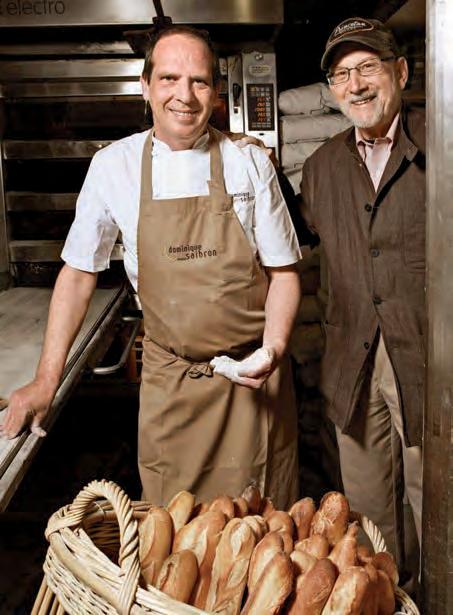
bread. But it’s not the stodgy flavour of factory bread. My taste buds detect hints of fruit and spice, but I can’t name them as precisely as the professor does. My mouth waters for more. I have a question for Saibron: “What’s your secret?”
“I make my flour to order,” he says. “I go to look at the wheat in the fields. I make assemblages of different varieties and then I bake-test batches of bread so I can choose the best.”
Since harvests vary, he makes a new selection of grains every year. They’re stored in silos with natural ventilation.
“It’s all about flavour. To make bread
that tastes great, you need really good flour made from really good wheat. The flour I use is 100 per cent wheat.”
Saibron leans forward. “To make good bread you need to respect time.” Five and a half hours, he says—for kneading, two fermentations, shaping and baking. By French law, a baguette labelled “tradition” cannot contain any chemical additives or be frozen at any stage.
I follow him, on tiles slippery with flour, into the back kitchens. Here, an apprentice baker, Axel, removes dough from the basin of the kneading machine, weighs and shapes it, then lays out the baguettes on trays between linen sheets, at a precise distance apart.
Saibron lifts the lid of a white plastic crate filled with a gooey substance the colour of dark honey.
“This is my own leaven. It’s made with honey and cinnamon, ginger, aniseed, vanilla, nutmeg.”
A little yeast and salt also go into the mixture, but much less than many other bakers use. Saibron relies on longer periods of fermentation to bring out flavour, and the salt is a gourmet sea salt from north-west France.
We move into the front kitchen where 16-year-old apprentice Théo, eyelashes dusted with flour, delicately razor-cuts a tray of unbaked baguettes. He loads them into the multi-tiered oven.
“Why is bread so important?” I ask.
The answer is so obvious to Saibron
he just shrugs.“You can’t have a meal without bread. It’s unthinkable!”
In 1789, rising bread prices contributed to provoking rioters to storm the Bastille and spark a revolution. Today, the Prefecture of Paris regulates bakers’ summer holidays so citizens need never stroll far for their daily staple.
In 2010 Saibron came third in the annual contest for the best baguette in the capital. This year he didn’t take part and the jury plumped for bread made by Sébastien Mauvieux. This baker, from an unpretentious neighbourhood near Sacré Coeur, won more than £3,000, plus the honour of supplying the Élysée palace for a year. At 90p for Mauvieux’s “tradition” baguette, every Parisian can enjoy bread fit for a president. More than that, it’s their democratic right to purchase just half a baguette from any bakery.
Professor Kaplan leaves Dominique Saibron with an oven-warm boule. The next morning, Sunday, finds me in Montmartre, on the cobbled Rue des Abbesses. Church bells are ringing and the first French strawberries are arriving in the greengrocer’s. I take a seat outside at Café Le Bruant, beneath a canopy. Tourists amble past, as do local bohemians in colourful clothing and Parisian girls with
I thought you’d be interested in the times on this road sign near Ashtead station, Surrey. Is someone mixing up their AMs and PMs, or am I missing something?
Thanks to Gill Robinson from Epsom, Surrey, for sending this in
upswept hair. A slim-hipped waiter brings black coffee and a white rectangular plate where, finally, next to strawberry jam and unsalted butter, lies half a baguette, split open. These are the makings of the tartine—a far more common everyday breakfast for most French families than croissants and pastries.
Remembering what I’ve learned, I force myself to pause and admire the burnished crust, to breathe on it and savour the toffee aroma. From the next table, a Finnish couple casts surprised glances at me.
I sniff the bread’s ivory insides.
Mmmm. Melon.
I dive in again with my nostrils.
Memories of licking the baking bowl in my mother’s kitchen.
I raise my nose, flick off the crumbs. The Finns are now staring.
Ignoring them, and ignoring the butter and jam, I bite into my baguette.
The tantalising crunch of crust gives way to a velvety, vanilla-flavoured interior and my taste buds tap-dance with delight.
Along the street I see Parisians—not known for patience—standing calmly in line outside a bakery, chatting and reading the newspaper. But, then, for the price of a baguette, who wouldn’t queue up for a taste of everyday luxury? n


Life’s not perfect, but, says Dr Sandi Mann, our rage at everything from bankers to indi erent customer service reflects a spoilt society
TURNING RIGHT AT A JUNCTION RECENTLY, I INCURRED THE WRATH of the driver behind for hesitating a fraction too long for his liking. By the onslaught of beeping horns, hand gestures and verbal abuse that spewed forth, you’d think that, at the very least, I’d been responsible for the murder of his entire family.
As an anger-management specialist, it never ceases to amaze me what people get worked up about these days. Mother Teresa got angry about poverty. Widespread hunger made Gandhi’s blood boil. Martin Luther King was fired up by social injustice. Yet we Britons seem to fly into frenzied indignation at all manner of minor provocations: fashion chains
►


◄
that only go up to size 12, politicians who have made relatively insignificant errors, families featured in the newspapers with ten kids.
Are these things really worth the heated anger they seem to induce? Or could it be that we have nothing better to get angry about any more?
Anger, like all emotions, has played a valuable role in human history. The red mist of rage helped our ancestors survive. If they’d been too laid-back about others stealing their food or predators trying to kill them, they wouldn’t have taken sufficient preventative action.
Indeed, research suggests that the development of our anger response has been part of our evolution. If we’re shown pictures of angry faces, for instance, we’re more motivated to want things than if we’re not. So anger can spur us on to attain the things we really need. Similarly, hunger makes us angry by altering our serotonin levels.
ANGER HAS ALSO HELPED US WORK IN CLOSE social groups, which brought its own benefits for survival in a hostile world. Losing our cool showed that we were displeased with others, that they needed to make mutually beneficial changes to their behaviour, and this stopped us from having to shift again and again from one unsatisfactory relationship to another.
But nowadays, Britons rarely experience real body-weakening poverty or genuine life-threatening injustice or mortal danger. The angry response is still hardwired into our brain, though, and with no real role in keeping us alive it “misfires”, leading us to get cross about the smaller, inconsequential stuff.
Barely a month goes by without the media reporting on some trivial dispute that escalates well beyond what’s reasonable. Recent examples include a road-rage incident that left a man dead and a fist-fight that started with two trolleys accidentally bumping into each other in an Ipswich supermarket.
Meanwhile, surveys reveal that call centres make 90 per cent of us cross, while a further 50 per cent get so frustrated with their computers that they hit or attack them.
None of these triggers for our anger is life-threatening, but it seems rage is insidiously becoming a routine communication strategy.
Part of the problem is that where we were once too preoccupied with keeping a roof over our heads to worry about whether a restaurant meal is lukewarm or which head of a company is getting paid what, now all our basic needs are met and our expectations have risen. It could be argued that we’re spoilt: like toddlers, we expect everything to
be perfect, and when it isn’t we stamp our feet.
The media and society have colluded in this—for example, supermarkets that say they’ll open a new till if there’s someone in front of you are creating an anger trigger when they invariably can’t live up to this expectation at busy times.
Do the smallest things make you see red?
Join the debate at facebook.com/readers digestuk or email readersletters@ readersdigest. co.uk
We can override the innate anger circuits in our brain by consciously challenging their appropriateness with a simple question: is this incident threatening our survival? If not, we should perhaps rein the anger in—by finding something really worth getting annoyed about instead. ■
The good news is that, if we’re aware our rage is often over the top or an atavistic programming fault, we might be better able to deal with it.
Dr Sandi Mann is the senior psychology lecturer at the University of Central Lancashire and author of Manage Your Anger (£10.99).
“Oh Well, Mustn’t Complain…”

Twitter account @SoVeryBritish documents typically British reactions to everyday scenarios (its slogan: “Making life awkward for ourselves, one rainy day at a time”). Here are just a few to fill us with patriotic pride:
Anxious bewilderment when clocking the stranger deciding to join the queue at your side rather than behind you.
Loudly tapping your fingers at the cashpoint, to assure the queue that you’ve asked for money and the wait is out of your hands.
Not wishing to tell someone they’ve misheard you, so simply soldiering into a completely di erent topic of conversation.
Feeling relief at spotting an empty unreserved seat after discovering somebody has occupied the one you booked.
Speeding up to pass a pavement hog, then feeling you must keep
up the uncomfortably fast pace until at least a mile away.
Inviting someone to a party, then providing a list of reasons not to come in case they don’t fancy it.
then providing a list of reasons
Being unable to turn and walk in the opposite direction without first taking out your phone and frowning at it.

amount of change from your
Entering into mild panic if unable to pick the correct amount of change from your hand within three seconds.



“What have I done wrong? I’m your friend”best


“I sit outside her house on a Sunday. It’s routine”my

“The path of true love is never smooth”






Eugene Costello talks to leading psychiatrist Dr Frank Farnham, who works with some of Britain’s most deluded criminals
In a grim part of Enfield, north London —all rundown brick housing and weed-choked driveways—lies Chase Farm Hospital, home of the National Stalking Clinic (NSC). It’s a suitable setting for treating those whose weird, obsessive behaviour causes misery and fear to thousands of people every year.
►
A guard buzzes me into the secure unit and a tall, broad-shouldered man greets me in the anteroom. “Hi, I’m Frank,” says the 48-year-old consultant forensic psychiatrist, in soft tones that belie the depressing nature of what we’re about to talk about. He leads me through some more security doors to a bare, functional interview room.
Dr Farnham starts his rough guide to stalking with a definition. Though legal descriptions may vary from country to country, for the clinic’s purposes stalking is basically persistent and unwanted attention that causes fear in the victim. The presence of fear is important, as it elevates behaviour from the unremarkable hurt feelings of, say, a former friend to harassment.
But to understand what motivates stalkers and perhaps treat them, says Farnham, you need to break them down into five types.
With the exception of a few doctor referrals, stalkers only end up at the NSC as a result of a court order that demands they undergo treatment instead of, or to reduce, a prison sentence or community service. But, troublingly, estimates suggest between eight and 20 per cent of adult British women are stalked at some point, and around 45 per cent of the dozens of offenders Farnham sees each year are rejected lovers.
“They tend to be angry, jealous men [90 per cent are male] with a strong sense of entitlement, often grandiose, yet allied to low self-esteem. They cannot cope with or tolerate the end of a relationship, so they harass their ex-partner instead. For that to become stalking might mean
a campaign lasting a year, though it can go on for five, ten or even 20 years.”
One of Dr Farnham’s patients, Paul*, was fairly typical of this type of stalker. The 40-year-old was a successful but narcissistic builder. “While his mother put food on the table and gave him clean clothes, she was emotionally unavailable, and that made him rather clingy and needy. He had a record of relationships ending acrimoniously and finished up in front of me after breaking up with a longterm partner with whom he had two kids. He’d had affairs left, right and centre, but saw nothing wrong with it. Yet when the relationship began to sour, he became certain she was seeing someone else and bought surveillance equipment to track her movements—he bugged the car and house. When the relationship ended, he started following her.”
Eventually, a garage mechanic found the car bug and Paul was cautioned, but he carried on following his ex for four years, ignoring community-service and restraining orders, and finally being sent to the NSC.
“The crazy thing was that he was in a new relationship, but he couldn’t stop himself stalking,” says Farnham. “He told me: ‘I’ll send her five texts a day during the week, three stroppy voicemails on Friday and Saturday night when I’ve had a drink, and I sit outside her house on a Sunday. It’s my routine; my life.’ ”
While a few people in the “rejected” category are too violent or opposed to treatment to be helped by the NSC, most accept they have a problem and some 70 per cent respond well to psychological and therapeutic techniques.
“Even if they refuse to accept they’ve
* Not his real name
done anything wrong, we say, ‘Well, I understand, but the court doesn’t see it that way. Life’s a bitch, but where do we go from here?’ And they get that, and we start work.”
A few weeks of talking through their anger and self-centred perceptions allows NSC staff to start to ask gently what effect they think their behaviour might be having on their victim. From there, cognitivebehavioural therapy—usually over six months or more—can then help the stalker improve their problem-solving techniques and other life skills.
The second group of stalkers, says Farnham, are dubbed “resentful”.
“They’re often pursuing a quest for justice. They have a grievance—the gas company did them out of £20 in 1984, say—and they’ve been pursuing it ever since. They might latch onto a community figure, such as their MP [Stephen Timms,
job, your mates and your partner has left you, so the stalking effectively becomes your job. I’ve seen people in this group who, believe it or not, have forgotten what the original grievance was.”
Some offenders will be mentally ill —perhaps with delusional illnesses—so treatment has to be decided case by case. “But almost all of them will require both psychiatric and psychological treatment; the question will be the ratio.”
The third and most interesting group from a psychiatric perspective, says Farnham, are “intimacy seekers”, who believe they’re in a love affair. This includes people with forms of erotomania, such as De Clérambault’s Syndrome, as displayed by Rhys Ifans’s character in the film of Ian McEwan’s novel Enduring Love.
“For some, the erotomania is a form of schizophrenia. Others have what I call ‘pathological infatuation’. They are still
“I’ve seen people who have forgotten what the original grievance was”
the Labour MP for East Ham, for example, who was stabbed twice in the stomach by Roshonara Choudhry in 2010 over his perceived support for the Iraq War], a doctor, a councillor and so forth.”
The offender’s problem is often compounded because their odd behaviour alienates the people who otherwise might keep them in check. “You’ve lost your
deluded but much better at hiding it, though it manifests itself suddenly.
“I have a patient who comes from another culture, who had little experience of women until he came to the UK and got a job that brought him into proximity with them. He fixated on a colleague and decided that the feeling was mutual, that she was sending him proof of her love ►
by giving him eye contact exactly when he was willing her to, and by sending signals, such as always sitting on the third chair to his left. So he followed her on the bus, then home. And when she said, ‘Stop it or I’ll call the police,’ this was part of the ritual. In his mind, she was testing the strength of his love.
“I asked him, ‘What are you doing? You’ve lost your job, you’re in trouble with the police, you’re terrorising this poor woman and your victim’s family have threatened to kill you.’
“He said, in all seriousness, ‘You know, the path of true love never runs smoothly, doctor. She’s the right one, and if I give up so easily I’ll never forgive myself, and nor will she.’ ”
Patients like these need psychiatric treatment, but after attending the NSC for a while, “they’re more open to us saying, ‘You need to develop better strategies in life. Look where this has got you.’ So we can achieve fairly good results.
n Vary the route you walk to work and the places you visit during your daily routine.
n Always walk in the direction of oncoming tra c to avoid kerb crawlers.
n When you’re out, have a back-up plan of places you could easily reach, such as a friend’s house or busy building, if something were to happen.
n Always conduct first dates or business meetings in public places.
n Avoid working alone, even in an o ce, where possible. Give a photo of your stalker to security sta and your manager.
n Keep a log of any harassment or odd behaviour, including the time, date and how it made you feel. Keep any emails, letters or presents you’ve been sent. Ask the police if they can loan you a CCTV system for your home.
n Go to the police as soon as someone’s sustained behaviour makes you feel scared or intimidated.
For more tips, see stalkinghelpline.org.
“That said, this group can become aggressive when their delusion is shattered —say, when the recipient of the attention suddenly changes attitude and makes it clear that the attention is unwanted. The stalker may feel they were led on. So we’d always advise victims to be clear from the word go. If you only answer the phone when you can see it’s the stalker after they ring 20 times, all he’ll take from that is he must ring 19 times before you’ll talk to them. So don’t answer at all.”
Similar to the intimacy seekers are the quaintly named “incompetent suitors”. These are people who want to get a boyfriend or girlfriend but are hopeless at it, perhaps because they have learning difficulties or very poor social skills.
“They tend to be gauche and forceful, so may turn up at the victim’s house and bang on the door, saying, ‘Why won’t you talk to me? I really love you!’ And the dad will warn them off and they’ll keep coming back, and they’ll end up here.
“Funnily enough, this group is perhaps the easiest to deal with because they tend to respond to a behavioural approach”— Farnham holds up his hand prohibitively —“where you say, ‘That’s not acceptable!’ They’re not bad people, just a bit childlike, so we drill social skills into them.”
The last group, however, are altogether more sinister individuals—again, usually men—who stalk women for sexual and even homicidal reasons.
“ ‘Predatory stalkers’ are the sort of people the police might stop because their car back light is out and then officers will find rape paraphernalia in the boot—ropes, night goggles and so forth,” says Farnham.
Perhaps luckily for Farnham, this sort of behaviour doesn’t fall within the NSC’s remit. Their patients are typically sentenced to a year or less in prison. “Once the predatory stalkers are caught, they’ve
either carried out, or are on the verge of carrying out, a horrific crime for which only [long-term] jail is an option.”
Still, there are risks in Farnham’s work. “An NHS psychiatrist called Jan Falkowski was stalked by a patient around ten years ago. She went through his bins, found a used condom, emptied it into her knickers, then went to the police and said he’d raped her. They DNA-tested it and he was arrested and charged. Luckily, they then found his girlfriend’s DNA in the sample too, so the stalker was imprisoned for perverting the course of justice.
“But,” concludes Farnham, “that’s fairly atypical.”
He walks me back to the high-security reception, leaving me to reflect on what I’ve learned. And wondering how he manages to remain a man of great warmth and humanity despite having to deal with some of the most unpalatable aspects of human behaviour. n

For all that science shapes society, there are areas of research that —to us amateurs, at least— seem a little fruitless.
In 2003, for instance, Plymouth University used a grant of £2,000 from
the Arts Council to uncover the fact that monkeys can’t type. Locked in a room with a computer, the six primates under observation got “bored” and “s*** on the keyboard”, thus ending the study.
A similar madness must have struck the researchers at Oxford University who spent £300,000 installing a shower in a pond in
2009. After observing ducks standing under the shower and drinking from it, they concluded that… ducks like water. Really.
Taking the biscuit, though, are the winners in the physiology category of the 2011 Ig Nobel Prize (awarded for trivial achievements in science). The title of their paper? “No Evidence of Contagious Yawning in the Red-Footed Tortoise.”

Welcome to the pages that help make life simpler, easier and—we hope—more fun!


There’s nothing like travelling long haul on a jumbo to ram home the importance of a

comfortable seat. As few of us are likely to turn left on boarding, here’s what to pick in economy for...
Space Exit row seats with extra leg room are so coveted airlines charge more for them, but because trays are stored in the arm, these seats are narrower
than the rest. Avoid bulkhead seats, where leg room is limited by the partition in front, and check out seat pitch, which measures leg room and stretching space. It averages 31 inches in economy, although Far East airlines may o er 34 inches. Find details on seatguru.com and seatexpert.com, which also highlight the seats to avoid.
Safety Studies consistently show that passengers in the rear have a greater chance of survival.
Whether it’s worth the greater turbulence, worse air quality, toilet queues and delayed meals, only you can decide.
All-round comfort Seats near the front of economy o er a quieter, smoother ride. Sta at the airline-review site Skytrax (airlinequality.com) nominate seats A, C, H and K in Rows 31–34 as their favourites in a 747.
Romance According to BA, its most sought-after seats are the four pairs at the back of a 747, o ering couples space and privacy at a civilised distance from the loos.
Optimists Unless you’re a frequent flyer passenger, your chance of an upgrade is rarer than hen’s teeth, but you can still benefit.
Elite travellers are the first to be upgraded, freeing up the plush seats they’re allocated in economy, says SeatGuru. Ask sta at the gate (not cabin crew, who have no authority to move you) if any “preferred” seats are now vacant —and hope you strike lucky.

The last thing anyone wants to do when the job situation is wobbly is to ask for time o . But every employee is entitled to take a few days to deal with a family emergency, and it needn’t be life-threatening. You can claim it if someone close is su ering from shock after an accident, a childminder lets you down, or your kid is in trouble at school. Your request can’t be refused and you can’t be fired or passed over for promotion for staying away, says the Department for Work and Pensions.
There are drawbacks. You can only take time o if the crisis involves a parent, child, partner, a member of your household or someone who relies on you for care. (While an elderly neighbour might count, an ailing sister may not.) It has to be a true emergency, so you can’t demand an afternoon to ferry a child to the dentist. (If they’re under five, take it out of your four-weeks-a-year parental leave.) And you might not get paid—that’s up to the employer.
Crucially, time o is limited. According to the Government, one or two days should be enough, which is fine if a child is sent home for fighting but derisory when a partner has died. As there’s no legal right to leave of absence after bereavement, see if your firm o ers compassionate leave. If they don’t —which speaks volumes about their ethos—you may need to use your holiday allowance. Call ACAS (Advisory, Conciliation and Arbitration Service) for confidential advice (0845 747 4747).
Sometimes even Sainsbury’s best is not enough, and what’s called for is truly spectacular cake. You don’t have to wrestle with sugar roses to impress. “I have very little ability with piping or icing,” confesses Cressida Bell, author of Cressida Bell’s Cake Design (£25), who uses fresh fruit and old-fashioned sweets to create edible mosaics.
True, it’s time-consuming, but anyone can do it, she says. All you need for her stunning Summer Fruit Star (top right) is a sponge



Yes, these are cakes. Yes, you can eat them
No one needs to pay for phone calls, says Dave Lindsay of campaign group Fair Telecoms.
To get to that happy state, beware these common myths. n Free weekend calls save money. Not if you make calls at other times—they’re often charged at a penalty rate, says Lindsay. Swap to an Anytime plan (£7 a month with BT) instead.
n There’s no longer any such thing as a local number! 0845 calls can cost even more than the standard rate, so check

cake glazed with apricot jam and covered with frosting or whipped cream, plus a mix of soft fruit. Sketch out a large star shape on the surface, then fill the points of the star with halved strawberries. Cover the gaps between points and the side of the cake with blueberries, punctuated with raspberries to look like jewels. Pile blackcurrants in the centre, topped with raspberries and redcurrants on their stalks. “Sprinkle with icing sugar and eat soon!” says Bell.

your package. All 084 and 087 numbers make money for organisations, so click on saynoto0870 to find an alternative and use one beginning 01, 02 or 03 instead.
n I’ll ring my son on his mobile. Don’t do it from a landline or you’ll be landed with a connection fee of around 15p, as well as the call itself.
n 0800 calls are free. They will be if Ofcom has its way, but they currently cost up to 40p/min from mobiles.
n I don’t pay for texts. If they’re longer than 160 characters, your handset may convert them to MMS messages at around 36p each. If you have a smartphone, download Whatsapp and send long texts, picture messages and videos for free.
n It won’t cost much to vote. Phoning
The X Factor costs 36p/min from BT lines, but others charge up to £1.65/min and phoning from a mobile cost a hefty £2.50/ min, says homephonechoices.co.uk. Ask your provider to block all 090 calls.

Out comes the sun and, too often, the fork and hoe. So heed Anne Swithinbank, author of The Half-Hour Gardener (£19.99), who reckons that the average garden takes just a couple of hours a week to maintain. “You can do it on Sunday morning or split it up,” she says, which leaves plenty of time for lolling on the sunlounger.
Better still, it needn’t involve gardening gloves. “You need to wander round the garden to spot what’s likely to go wrong and make a lot of work for you later,” she says. Jobs to tackle immediately include pulling up weeds that are going to seed, cutting hedges once a year and mulching. If you spot ground elder or bindweed, get them out fast, even if you pay someone to do it, and cover cleared beds with black polythene to keep them weed-free.
When you’re ready to plant, opt for a mixed border, with tall bushes and slow-growing trees like the Mount Fuji Flowering Cherry, plus hardy shrubs (try frothy sorbaria seb). Add easy-care perennials like sedum and phlox to fill the gaps, crowd out weeds with ground-cover and create colourful focal points with strategically placed pots.
Then mow the lawn, tidy the flowerbeds nearest the house (let the garden grow wilder further away) and deadhead plants, before pouring yourself a well-earned drink. While listening to Anne on BBC Radio 4’s Gardener’s Question Time, of course.
Copy the slowgrowing Mount Fuji Flowering Cherry and take your time


baby is called, the name will soar in popularity, says Sarah Bartlett of babycentre.co.uk. Harry topped the list of UK boys’ names last year, William entered the top ten, and Zara and Beatrice are steadily climbing the charts.
Picking a princely handle can be a wise move. People with royal names such as Elizabeth and James are seen as successful and intelligent, says psychologist Richard Wiseman. What’s more, they usually are, maybe because teachers and employers favour those they associate with success.
Borrowing the names of other celebs is riskier. “After Jude Law was caught cheating, the name’s popularity declined sharply,” says Anna Powell-Smith, who tracks trends on names.darkgreener. com. Worst of all are political ones: Cameron, Blair and Cherie plummeted in popularity when their owners made the headlines. But new parents who regret their choice can take heart—they have the right to change the name for a year after registering the birth.

I’ll nose. My Arrange excess cover through
● Cars are cheap but insurance is sky-high. Buying a damageexcess waiver that pays out if you have a prang is essential, but if you wait until you get to the desk, I’ll charge you through the nose. My advice? Arrange excess cover through your own insurer and make sure you’re covered for tyre damage and windscreen replacement too, as both are costly.
● Size matters. Pick a small car if you’re just nipping down to the beach and double your spending money. Renting a Corsa for a week in Spain costs £153 high-season. C3 Picasso is £370 (both per week).
● Driving in Europe? Opt for diesel. It’s usually still cheaper than petrol and as you get 10% more miles per gallon, it’s a no-brainer if you’re touring.
● You can’t always get what you want. I know you booked a VW Golf, but the small print says “or equivalent”. Most rental companies source cars locally, so you’re likely to get a Fiat in Italy, whatever you specify.
● Haggle. Don’t accept the rate I quote first. Most carhire companies are willing to negotiate, so aim for at least 10% o .
SOURCES: BRITISH VEHICLE RENTAL AND LEASING ASSOCIATION; HOLIDAY AUTOS; MONEYSAVING EXPERT.COM; UK MOTORING JOURNALISTS; WHICH?

● Get a free upgrade. Ask at the desk when you collect your car. If business is slack more of the fleet will be available, and as the cheapest cars are easiest to rent out, I’m often happy to oblige.
● Bring your own satnav...
Budget cars don’t have them and I’ll charge up to £50 a week to supply one. If you don’t have a satnav, download Navfree to your tablet or phone. It has maps for Europe and the US, and won’t cost you a penny.
● ...and child seats. A safety seat and booster for two small kids could total £140 for a fortnight. That’s an awful lot of ice creams.
● Don’t go there. Check with me before you cross a border. My insurance may not cover
you, even if both countries are in the EU.
● You’re too old. I won’t hire cars to people under 25 or over 70 unless they pay a premium.
It’s not just me: in Ireland, over 75s are banned from renting cars and restrictions apply in many other countries. In the UK, they usually start at 69.
● Check the wheels. If you only give the car a glance before you drive o , you’re making a big mistake. I’ll charge you full whack for damage that’s not recorded, so check the car and make sure scrapes are noted in the agreement. In particular, be sure to examine the wheels. Grazes here are often missed and they’re a nice little earner for me.

● Spot the nearest cheap petrol station It’s usual to return the car with the amount of fuel that was in it when you left, and if you let me fill it up, I’ll charge top dollar. Just don’t wait until the last moment as fuel stations near the airport can be pricey.
● Sorry, this licence won’t do. I need both parts, not just the photocard, before I hand over the keys. n



“What do you do?” asked the taxi driver. My heart sank. Please, just drive, I felt like screaming.
I knew how the conversation would go. I’d tell him I’m a doctor, and then one of two things would happen. Either he’d show me a part of his anatomy and ask me what I think of it. Is it cancer? Is it infected? Is it going to drop o ? Or he’d launch into a story about a relative’s misdiagnosis and how doctors don’t know it all.
I took a deep breath. “I’m a doctor,” I said. “I’m about to work a night shift”—and then quickly added, “And I’m really late, so I’d appreciate it if we could hurry.”
“What type of doctor are you
For most of us, all of science is an article of faith
then?” he asked, slowing down rather than speeding up. One in a real rush, I think to myself.
“I work in general medicine and geriatrics, but I’m on call this evening, covering various wards.”
I waited for the usual responses. But instead he said something rather surprising, “You believe in God then?”
I looked out of the window: this was definitely not the road to Damascus. “Erm, no,” I replied —but thought how, at the moment, I’d appreciate some divine intervention with regard to the accelerator.
He looked at me in his mirror, puzzled. “Then how do you do your job? Seeing all that su ering. Don’t you ever wonder what the point of it all is?”
I suppose the thing about being a doctor is that, while you definitely come up against the major questions of the human condition, it’s easy to avoid confronting them—first because you’re often too busy to go to the toilet, let alone ponder the meaning of life; and second, because you’d rather be in bed asleep. But I can certainly understand how people take
comfort from religion, especially when faced with the bleak reality of death and disease.
Belief in God is, of course, a matter of faith, inconsistent with a rational, scientific understanding of the world. But I can’t help wondering if science is a matter of faith too, relying just as much as religion supposedly does on the brain’s tendency to want answers to complex questions, and to believe in the unbelievable.
Hard-line rationalists argue that religion is a ludicrous set of beliefs spread by the gullible. But everything I base my own practice on is received wisdom. For most of us, all of science is an article of faith: something spectacular and beyond comprehension that we take as true without ever being able to question it with any authority.



The cab driver arrived at the hospital and I got out. Later, I was called to certify a patient dead. Before being admitted, he’d been in a nursing home with dementia—and for the last year, he hadn’t recognised his wife. I examined the body, signed the death certificate and went back to the on-call room. On the way, I thought about my conversation with the cab driver. And then I went to sleep—but not before remembering a childhood prayer.
Max Pemberton is a hospital doctor and author. His most recent book is The Doctor Will See You Now

This myth is so widespread that even many doctors believe it’s true. Despite the concerns, however, there’s very little evidence to support it. Early studies showed that mobile devices interfere with approximately four per cent of hospital devices—but only when in very close proximity to them. Since then, further research has shown that, although interference is possible in a small number of devices, it’s not clinically relevant. There hasn’t been a single case of someone dying in a hospital as a result of electromagnetic interference from a mobile phone.
WHERE DID THE MYTH COME FROM? It seems a lot of the worry comes from one newspaper article in 1994 that looked at the data that showed some interference was possible. Shortly after it appeared, hospitals began to ban or restrict mobile phone use.

SO THERE’S NOTHING TO WORRY ABOUT? An interesting study has shown that doctors’ use of mobile phones on wards and in operating theatres has actually improved safety and patient survival, because of faster and better communication. Yet, while there’s no real risk from visitors and patients using a mobile phone in a hospital, that’s not to say that it can’t disturb and annoy other patients as they convalesce. So it’s still often best to step outside to use one. ■







I’ve recently come across two health claims on Facebook. One says that coughing can act as do-it-yourself CPR if you have a heart attack when you’re alone. The other warns that drinking cold water with food can cause heart attacks and cancer. But is there any truth in them? I’d thought I’d ask an expert.
Remember:
If you have chest pains, ignore the latest urban legends—and just get to A&E
“No,” is the short answer from Dr Rodney Foale, a cardiologist at the Bupa Cromwell Hospital in London.
Of the first claim, he says: “With a heart attack, your heart stops and there’s no blood circulating—so you lose consciousness and can’t cough.” What does work, he adds, is external compression: in other words, someone else doing CPR.
Foale pours cold water on the other theory too. “Lots of things cause cancer and heart attacks. Cold drinks are not one of them.”
If you do have constricting, cramping chest pains, you have a blocked artery and need to get to A&E. Call a friend, a taxi or an ambulance and get there as soon as you can. And, if possible, take an aspirin.
When it’s boiling outside, Brits love to throw open the windows. But that’s the wrong thing to do if you want to avoid melting like an ice cream, because it lets in the warm air. Go to hot countries and you’ll notice that shutters are closed during the day. So, instead of opening your windows, close your curtains—and only open up when it’s cool in the evening.
You can go a long way towards preventing a heart attack in the first place, says Foale, by avoiding fatty foods and tobacco—and by not allowing yourself to become overweight. And make sure blood pressure and cholesterol are kept under control.
As for those internet health claims, file under urban legend!

And now for this month’s celebrity quiz question: why doesn’t radio presenter Chris Evans want to wear shorts any more? The answer is that he’s ashamed of his varicose veins, describing them as like “wearing your colon on the outside of your inner thigh”.
According to consultant vascular surgeon Eddie Chaloner, about a quarter of men su er from varicose veins, compared with about a third of women. But because men are less concerned with their appearance, they tend to wait longer before seeking help.
Naturally, their veins are much worse by the time they roll up their trouser legs for the GP.
But ignoring the problem is a bad strategy. “Long-standing varicose veins can damage the skin around the ankle,” explains Chaloner. “Initially, this makes it quite dry and itchy—and can lead to discoloration and eventually to a venous ulcer, which is a painful and smelly sore that doesn’t heal up. This is a serious business and best avoided.”
But can you prevent varicose veins to begin with? “Sadly not,” says Chaloner. Compression stockings can help ease the aching and itching, although they need to be good quality and well fitting. In the end, though, surgery is usually a better bet. So don’t wait until your veins are like Chris Evans’s—head o to your GP and find out what your options are.


1Rosemary for brainpower. Northumbria University’s Brain, Performance and Nutrition Research Centre has found that one of rosemary’s major chemicals is linked to better cognitive performance.
2Parsley to prevent breast cancer. When rats with breast cancer were exposed to apigenin, found in parsley, they developed fewer tumours.
3Peppermint to soothe irritable bowel syndrome.
Australian scientists have shown

Varicose veins: do men wait too long before seeking help?

that peppermint helps relieve IBS by activating an anti-pain channel in the colon.
4Oregano to reduce inflammation. According to research done on mice with inflamed paws, if they’re treated with oregano’s active ingredient beta-caryophyllin, the swelling subsides in 70 per cent of cases.
5Thyme for antioxidants. Thyme is a herb with a particularly high content of antioxidants—thought to protect cells from damage.
►
Did you know that there is a herbal remedy available to help men with bladder symptoms of an enlarged prostate such as frequent urination, weak stream and having to get up at night for the toilet?












Prostasan®
Saw Palmetto capsules
A traditional herbal medicinal product used for the relief of lower urinary tract symptoms in men who have a confirmed diagnosis of benign prostatic hypertrophy (BPH), based on traditional use only. Always read the leaflet.
Available from health stores, pharmacies, we’re good for you
Available at larger & boots.com
Take a minute to check the health of your prostate. Visit www.avogel co.uk/prostate For more information call our helpline on 0845 608 5858.


UPS: Alcohol Decreases Your Cancer Risk. Red wine contains the powerhouse chemical resveratrol—long known to reduce body inflammation, cholesterol, heart disease and certain forms of cancer.

DOWNS: Alcohol Increases Your Cancer Risk. A UK study of more than a million women found that even low consumption increases your cancer risk. It also suggested that booze could account for nearly 13 per cent of all breast, liver, rectum and digestive-tract cancers.

UPS: Drink Benefits Your Brain. Research is mounting that moderate alcohol consumption improves cognitive skills, learning and memory. Not only that, but a review of more than 140 studies found that a drink a day for women (two for men) reduced Alzheimer’s risk by 23 per cent.
DOWNS: Drink Damages Your Brain. Even small amounts of alcohol reduce brain volume, something associated with cognitive decline and dementia.
UPS: It Helps Your Bones. The silicon in beer has for years been linked to healthy bones. Newer studies are now suggesting that moderate amounts of alcohol may benefit women’s bone health and lower their risk of osteoporosis, especially after menopause.
DOWNS: It Harms Your Bones. Excessive amounts of booze, especially for young women, are linked to—yes, osteoporosis.

UPS: It Keeps You Slim. The surprise finding from a US study, which followed more than 19,000 women for 13 years, was that those who drank no alcohol piled on more pounds than those who drank just a bit.
We are too! So here’s some of the most significant research into the pros and cons of alcohol

DOWNS: It Makes You Fat. A study from the 1990s found that enjoying a drink with your meal makes you more likely to guzzle fatty foods. Plus, alcohol is known to slow down metabolism, making it more di cult to maintain a healthy weight.
UPS: It’ll Help You Live Longer. University of Texas researchers found that moderate drinkers live longer than abstainers. They studied nearly 2,000 people aged 55 to 65—and, after two decades, 69 per cent of the non-drinkers had died, compared with just 41 per cent of moderate drinkers.
DOWNS: It’ll Kill You. Soberingly, a 2010 study in The Lancet ranked booze ahead of heroin and crack as mankind’s most harmful drug.
OUR ADVICE: alcohol can be good for you—but only in small amounts. Stick to one drink a day if you’re a woman, and two if you’re a man. Cheers! ■
























As we move through life our nutritional requirements change, so why take an ordinary multivitamin when there is a supplement tailored to your specific needs? The award-winning Vitabiotics wellness range offers comprehensive nutritional support from sensible, balanced formulae. With 40 years’ experience, there is no supplement range for specific life stages more relied on than Vitabiotics.
The UK’s No.1 range for specific life stages
From , Superdrug, Holland & Barrett, Lloydspharmacy, GNC, supermarkets, health stores,independent pharmacies & www.vitabiotics.com

When finances are under pressure, people are attracted to increasingly desperate measures to improve their position. Typically, a middle-class family may be asset-rich but cash-poor, and many also have healthy pension pots that are very tempting to raid. Except you’re not allowed to do so.
There are advertisments everywhere for pensionrelease schemes, and while this is attractive as a stopgap measure, it could open you up to disastrous consequences in the future. You’re only entitled to

exercise some release from your pension at 55 and, while there are many apparently “lawful” schemes promising release opportunities, the penalties are huge.
Typically, a pensionrelease scheme will take
QI booked a taxi to go to the airport and allowed 90 minutes for a 30-minute journey. The taxi company lost me in the system, they arrived over an hour late and I missed my flight. They gave me back my fare, but could I claim for the flight?
Donal MacIntyre is an investigative journalist and a former presenter of ITV’s London Tonight
A Roll-on consequences are accepted in some countries, and I believe you have a claim where the failure is clearly the fault of the taxi company. It hasn’t been tested in our courts, but
up to 20% in fees and still leave you potentially liable for the 40% tax relief that Her Majesty’s Revenue and Customs allows on your entire pension pot. Every week, HMRC warns of sharks in these pensionrelease waters—scams involve people signing the paperwork and only ending up with 30% of their funds, for example, or the scheme taking all the pension.
Get legal advice and understand that HMRC doesn’t recognise or support any scheme that isn’t a bona fide pensioninvestment plan.
there’s clearly an expectation that your service should do what it says on the tin. I suspect your case would be stronger if it was a specific airport-transit company or if you’d given them a clear time to be at the airport. The question of damages would have to be proportionate, but if the cause of delay was indisputable I could see a claim in the small claims court, limited perhaps to £150. Otherwise firms would be reluctant to take the business. ■










If your days out are being ruined by too many visits to the toilet you may be su ering from an overactive bladder.
Over 7 million people in the UK su er too, so you’re not alone.
Luckily there are treatment options available including e ective medications from your doctor.
To find out more about overactive bladder and the help available visit
www.bladderproblem.co.uk
Or call our free helpline on 0800 011 4766
















“We can insure you up to any age. There are a few exclusions, such as not wittering on about how much better the old days were.”
Getting travel insurance when you’re over 60 can be di cult— or just very pricey. Follow these tips, though, and you should be able to find yourself a fair deal.
Annoyingly, the older you get, the more of a risk you seem to an insurer—and the more expensive your travel insurance becomes. But with the number of people travelling in their sixties, seventies, eighties and even nineties increasing every year, more insurers are now entering the market. So how can you take advantage of what they’re o ering?

If you’re having problems getting a policy—or if the insurance company is trying to charge you an extortionate price—a specialist insurance broker will certainly help. Head to the British Insurance Brokers Association (BIBA) website at biba.org.uk and look at their searchable database, or give them a call on 0870 950 1790.
BIBA can direct you to extremely specialised brokers, covering everything from cancer patients and the disabled to the over-85s. The great thing about using their service is that you’ll
be put in touch with people who properly understand your particular condition—and who can tailor a policy to best suit your needs.
There are also a few specialist insurers in the market. Here are three of the best:
allcleartravel.co.uk. As long as you have permission from your doctor to fly, AllClear will be able to cover you for just about any medical condition or disability when most insurers would refuse.
It’s also fairer to older people. Most insurance companies group people into age ranges—65 to 70, say—for calculating risk and therefore the cost of premiums. This means that the 65-year-olds pay more than necessary because they have to shoulder the risk of the 70-year-olds.
AllClear doesn’t do that. It gradually increases the cost year by year instead—a much better method.
goodtogoinsurance.com.
GoodToGo specialises in travel insurance for the over-65s— but can provide cover for travellers of any age, even if you’re over 90. Its website is very informative and easy to use, so do check it out. world-first.co.uk. This is a company that o ers travel insurance to anyone up to the age of 100, and to people with pre-existing medical conditions.
You’ll be covered for cancellations, travel delays, baggage loss, £5m worth of medical costs and more.
● It doesn’t always follow that travel-insurance policies specifically designed for the over-60s are the cheapest—so don’t dismiss regular policies without investigating them.
● There’s always a lot of competition between insurers. This means that (within reason) you can barter to get a better deal.
● You must remember to warn your insurer of any medical condition that arises after your policy has been taken out. If you don’t, your cover may be invalid.
● If you take a long-haul holiday two or three times a year, an annual policy is likely to work out cheaper.
● The most important thing to bear in mind with travel insurance for the over-70s is that you may have to pay a slightly higher excess on your policy. Unfortunately, this is the case with most insurance companies, so always read the small print before purchasing to make sure you’re aware of any costs you might have to pay.
» If you’re now in the mood for travel, see p132 for rollicking proof that age needn’t stop you.
There’s a new range of juices from Del Monte called Del Monte Occasions. Inspired by popular cocktails, they can be served neat with ice or blended with alcohol. We’re giving you the chance to try them at half price. Just put the code RDJULY13 into the website at dlmte.co/rd ►
With so many people in the world wanting to learn English, there’s a huge demand for teachers. And it’s something you can charge for
Going abroad to teach English is a popular option for twentysomethings fresh out of university and for retired people wanting a bit of sun. However, there are also plenty of non-native speakers living in the UK who want lessons and are prepared to pay for them. The abbreviation TEFL is generally used for Teaching English as a Foreign Language abroad—and TESOL (Teaching English to Speakers of Other Languages) for people already living in an English-speaking country.
FACT 30% of Brits aged 55–64 took more than four holidays in the UK in the twelve months to September 2011—and 10% took more than four holidays abroad
You don’t need a qualification to teach English to private students—if you manage to get them. Most language schools, though, require a teacher to hold either a CELTA (Certificate in English Language Teaching to Adults, from Cambridge University) or the Trinity Cert TESOL, from Trinity College in London. Courses for both are run in numerous locations in the UK.
The starting salary for a newly qualified teacher is around £10 an hour and rises with experience. If you work as a private tutor you can start by charging about £20 an hour, although £30+ would be reasonable for an experienced teacher. You can also charge for proofreading essays.
...is get as much as you can for free. If you have pets, join petaround.co.uk, which will put you in touch with local animal lovers who are happy to do some pet sitting for no charge. Also, join your local freecycle.org group to get amazing furniture, o ce supplies, homeware and clothes totally free. Head to ReadItSwapIt.co.uk, where you can get free books by swapping the ones you’ve already read. And finally, go to Musicovery. com to listen to music for free online. You can choose songs by a wide range of genres, or simply to match your mood.
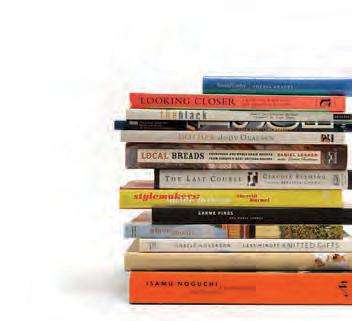
This is a short-term drop in stock-market prices. The phrase comes from the idea that the drop happens because shares have been generally overpriced and this “correction” sees them returning to their proper values.
Jasmine Birtles is a personal finance writer and the founder of moneymagpie.com






Remember when we thought we knew what the world of tomorrow would be like? Nobody really knows what the future holds, but we’re fairly sure that no matter what, you’ll want to be financially secure. Reader’s Digest have an exciting partnership with LV= and that’s just the sort of thing LV= have been helping out with for 170 years. For more information, give their earth-based call centre a ring today. Let

This exotic and slightly tropical dish is an ideal alternative to the usual boring old lettuce, tomato and cucumber combo, and it’ll certainly add a zing to your evening meal. If the aniseed flavour of the Pernod or ouzo isn’t your thing, simply use white vermouth instead.
4 salmon fillets, about 675g For the dressing: 1tbsp olive or sunflower oil
200g asparagus spears
1 large stick celery
250g mixed salad leaves
1. Put a kettle of water on to boil. Skin the salmon, remove any bones and cut it into large cubes. Heat the oil in a frying pan and stir-fry the salmon for 2–3 mins until just cooked through and lightly browned. Drain on kitchen paper.
2. Rinse and trim the asparagus spears, cut them into 4cm pieces, cover with the boiling water and blanch for 2 minutes. Rinse under cold water and drain.
3. To make the dressing, peel the mangoes and cut into cubes: you need about 500g. Place in a food processor or bowl.
2 large mangoes
4 chives
100g natural yogurt
1tsp wholegrain mustard
1tsp Pernod or ouzo
Black pepper
Rinse and dry the chives and snip them into the mango. Add the yogurt, mustard and Pernod or ouzo and purée. Add black pepper to taste.
4. Rinse, de-string and finely slice the celery stick. Put it into a bowl with the salmon and asparagus. Pour the dressing over the top, holding a little back in case there’s more than you need. Toss gently, taking care not to break up the salmon.
5. Trim, rinse and dry the salad leaves, then arrange them on four serving plates and top with the salmon salad. ■





Tough on slime, tough on the causes of slime

QI’m plagued by slugs and snails. Are the nematodes advertised to kill them natural? And, more importantly, do they work?
AYes and yes. These are minute parasites found in the soil naturally—by watering huge numbers onto soil and plants, some soon come into contact with the slugs and dispatch them. Soil and plants need to be moist and the temperature warm for them
to work well. They arrive by post, often on a sponge—you squeeze this into a watering can or three and apply. They’re not cheap, but they do a very e cient job.
Q
I’m growing sweetcorn, but so are my fellow allotmenteers. The packets say that other varieties growing nearby create a problem with cross-pollination, but I don’t really understand why.
A
In theory, pollination by a di erent variety could alter some kernels in a cob (if a red-seeded variety was nearby, for example, some kernels in a yellow cob might become red or pink). The problem is less visible with more highly bred F1 varieties, which might lose their special attributes such as a longer shelf life. This sort of thing is much more of a problem for the commercial grower wishing to sell his produce to the supermarkets, which demand visual perfection.
In practice, a mixture of many di erent varieties simply won’t flower at the same time, and the wind may blow away a potential cuckold’s pollen. Anyway, ►
misbegotten kernels probably won’t be di erent in any apparent or detrimental way, especially if you eat your cobs not long after picking them.
QMy runner beans did badly last year. What can I do to be surer of my crop this year?

AIt was a cold, wet year, not conducive to these lovers of warmth (although they do like it wet). If it’s a good summer they do fine; if it’s too hot and dry, they need lots of watering but still do fine. If this is a repeat of last year, you might consider growing dwarf French beans under cover in tubs.
You can grow runner beans under cover, but they take up a lot of head height (you can train them horizontally instead). If you nip out their tips they get bushier, so they’re easier to protect outdoors. Covering them with a clear plastic sheet during cold weather will keep them warmer and more productive, but it’ll need careful positioning, tying and ventilation.
Bob Flowerdew is an organic gardener and a regular on BBC Radio 4’s Gardeners’ Question Time. Send your gardening questions to Bob at excerpts@readersdigest.co.uk


This is the time to harvest and to put away the best for later. So jam, juice, jelly, pickle, dry, freeze and bottle everything possible. Keep mowing your grass even during dry spells, but raise the height of the cut significantly. Keep dead-heading blooms as they fade, and feed and water generously. Thin the apple and pear fruitlets, leaving only the very best to mature. Then thin out and renovate your houseplants—ruthlessly deselect the mi y poor performers, then tidy and pot up only those really worth keeping.

When ordering plants from catalogues, cut out the photos and put them in a scrapbook. When the plants arrive, you’ll remember how they look fully grown. And you’ll save space by putting the remainder of each catalogue in your recycling bin! ■
Thanks to Evelyn Brown of Powys for this tip

Email your gardening tips and ideas—with photos, if possible—to excerpts@readersdigest.co.uk. We’ll pay £50 if we use them on this page.











As kids, my brother and I spent most Saturdays jamming ji y bags with my father’s selfpublished gardening book. Sitting amid the jumble of volumes heaped high in our sitting room, I loved both the crazy and chaotic world of running a small business and being surrounded by books.

feats of imagination conjured up years to come with the mere
I love reading. I’m lucky enough to sit on the board of the Women’s Prize for Fiction, and it’s been a real treat and privilege to dip my toes into the truly magical feats of imagination conjured up by these extraordinary writers. Nothing beats charging back to Victorian London, driving through a small farm in the US, or experiencing Japan in years to come with the mere flick of a page.
It’ll come as little surprise that I applaud anything that gets people reading. For many, digital books have
It’ll come as little surprise




transformed their relationship with the written word, and it seems crazy that Amazon released the Kindle in the UK only four years ago. The market is now stu ed with rivals such as the Nook and Kobo (digitalunite. com can help you choose), and Amazon alone sells an amazing 114 e-books for every 100 printed volumes in the UK. It took four years for e-books to outsell print books in the US; here it took two.



and Amazon alone sells an the for e-books
While sometimes there’s
nothing quite like curling up with—dare I say it?—a printed volume, with 24/7 access to millions of books, magazines and papers, I’m not surprised that e-books have proved so popular. Allowing us to carry a mindboggling array of material on thin, lightweight gadgets, a third of Brits now own one and, on average, Kindle owners buy four times more than before.
Happily, the in-built accessibility of these devices can also improve the reading experience of those who struggle with traditionally printed works. Plus, apps make for easier access to your library across devices; if borrowing’s your thing, lots of libraries o er e-book lending as well.
I’m hugely excited by online opportunities for writers. The web would have made it much easier for my father, and while I don’t have plans to write my own book just yet, if I ever do it’ll be a lot easier than stu ng ji y bags.
l Project Gutenberg (gutenberg.org) is a volunteer project to digitise and archive cultural books. With over 42,000 free e-books to download or read online, it even has a selfpublishing portal and is always on the lookout for helpers.
l Wattpad.com holds over ten million stories. Every minute, it connects 10,000 readers with something new, and 500 writers have used it to self-publish pieces, often serially, to gain instant feedback. Collect stories into reading lists, vote for your favourites, share and comment.

Are you inspired to share your digital skills with others? Visit go-on.co.uk/ rdigest for more. Or to find a local taster session, call freephone 0800 77 1234
l The Evernote Smart Notebook by Moleskine has a special page design, making it super simple to capture pages with a smartphone or tablet. Now, instead of recording things twice, it can instantly transform stories and sketches into digital documents.
l Clever old Nesta (nesta.org.uk/bookshare) can help you discover and share books with others by setting up a website. Providing free code, it allows anyone to create their own super-simple community site. Once up and running, upload details of your volumes and share with other borrowers.
YouTube.com is a site where you can upload (posting something on to the internet), watch, share, comment on and rate videos. We use it to upload a whopping 72 hours of video worldwide every minute, and watch four billion hours of film a month. Search for anything that tickles your fancy—maybe an old comedy, “how to” or song—or share your own. You’ll need to set up an account and connect your camera to your device, use a webcam, or shoot and share directly from your mobile or tablet. Then simply log into YouTube and hit the “upload video” button. ■

Without tarmacked roads, the modern world simply couldn’t function. The black stu is a constant feature of our daily lives, but the first asphalted roads actually appeared in Babylon way back in 625BC—it took over 2,000 years for them to arrive in the UK. (Asphalt, or bitumen, occurs naturally and is the semi-solid state of petroleum.)
John McAdam, who loaned his name to tarmac, never produced asphalted roads. His innovative road surface was stonebased but hugely e cient to construct. When cars

arrived, his surfaces kicked up too much dust, so road constructors started covering the roads in asphalt tar. Tarmac (short for tarmacadam, or tarpenetration macadam) was finally patented in the UK by Edgar Purnell Hooley in 1901. These hard-wearing
surfaces enabled people to unlock the true potential of the new motorcar.
The road surfaces we know now are technically asphalt concrete— bitumen, concrete and small aggregate mixed prior to laying and rolling. But the term “tarmac” has become a generic term for transport surfaces. When we say, “The plane is on the tarmac,” it usually isn’t —it’s on concrete.
While it might feel like the UK is aching under ever more roads, it’s estimated that the actual percentage of UK land under tarmac is only about 1.5% at the most.
BMW 320d GT, (£30,910)
Munich’s car blizzard continues with a new version of BMW’s standard 3-series saloon. This GT 3-series promises estate-like size in a smaller package, and it does it by bulking out rather than lengthening the vehicle. The result is a smallish car that’s cavernous inside. There’s a premium to pay for this space (£2,600 extra), but if you need the access and storage benefits this is a great package.

New research reveals 40% of motorists
find their passengers distracting. Claims lodged with Admiral insurance include, “My mother held her arm right in front of my eyes to show me where to turn,” and my favourite, “My ex-wife slapped me while I was driving at speed on the M5.” Ouch! ■


As we grow older our thoughts naturally turn to the future and the changes we can make to improve our lifestyle. If you’ve never considered a park home before, then think again. You can downsize and release capital, but still have a detached residence with all of today’s modern conveniences. You might be surprised to learn that people from all walks of life and professions choose to live in a park home, or to buy one as a second home. They enable you to be part of a welcoming community, live in a modern home with a high-spec interior at remarkable value for money. Some parks are exclusively for people over 45 or 50, so that your lifestyle is compatible with your neighbours.
Homes Available from £89,995
These are just some of the stunning homes available. Call us today or visit our website for more details of homes and plots available across the country, or experience our parks for yourself by coming along to one of our Open Days.






paid.
Park Home Price: £129,950
Open weekends:
Roecliffe Park - 29 & 30 JUNE
Roecliffe, North Yorkshire, YO51 9LY
Truro Heights - 29 & 30 JUNE
Kenwyh Hill, Truro, TR1 3DY
Tregatillian Park - 29 & 30 JUNE
St Columb Major, TR9 6JL
Thornlea Park - 29 & 30 JUNE
Littlehampton, West Sussex BN17 7QD
Hedge Barton Park - 29 & 30 JUNE
Fordcombe, Tunbridge Wells, Kent TN3 0SL
Radwell Court - 6 & 7 JULY
Radwell, Bedfordshire, MK43 7HS
Folly Park - 6 & 7 JULY
Clapham, Bedfordshire MK41 6AL
Peppercorn Park - 6 & 7 JULY
Clapham, Bedfordshire MK41 6HB
Kingsmead Park - 6 & 7 JULY
Rushden, Northants NN10 0NF
Cotswold Manor - 6 & 7 JULY
Stratford Bridge, Ripple, GL20 6HE
Cheltenham Spa Parks - 6 & 7 JULY
Bamfurlong Lane, Staverton, GL51 6TD
Takeley Park - 6 & 7 JULY
Takeley Park, Takeley, CM22 6TD
Braintree Park - 6 & 7 JULY
Coggeshall Road, Braintree, CM7 9DW
Rymer Point Park - 13 & 14 JULY
Barnham, Nr Bury St Edmunds IP24 2PY
Waterbeach Park - 13 & 14 JULY
Denny End Road, Waterbeach CB25 9PF
Regency Court - 13 & 14 JULY
Allhallows-on-sea, Rochester, Kent, ME3 9TD
Wickham Court - 20 & 21 JULY
Fareham, Hants PO17 6JS
Organford Manor - 20 & 21 JULY
Poole, Dorset BH16 6ES
Westgate Park - 20 & 21 JULY
Westgate, Sleaford, NG34 7QP
Roecliffe Park - 20 & 21 JULY
Roecliffe, North Yorkshire, YO51 9LY


Bridge over famous water: visitors soak up Monet’s garden; (inset) Château de Montfort



Send us a photo of your favourite holiday, tell us briefly what made it so special, and if we include it on this page we’ll pay you £50. See address on p6.

walls golden in the lateafternoon sunshine.
We wandered around colourful morning markets and dined later “al fresco” in medieval courtyards. In the early mornings we cycled through avenues of cypress trees, passing tiny French hamlets and sun-drenched fields of poppies to purchase our breakfast “batons” from the boulangerie.

and dined later “al fresco”
Pat Needham from Lancashire finished a French jaunt with a visit to artist Claude Monet’s gardens at Giverny, where she was both enchanted and inspired
We headed south from Paris en route to the Dordogne, seeking majestic chateaux, scented fields of lavender, sparkling rivers and hopefully sunshine.
The gods favoured us with all of this and more. On the River Dordogne we paddled a canoe on sun-dappled waters, passing near the town of Sarlat. The Château de Montfort towered above us, its sandstone
But for me, the artist in the family, the highlight was visiting Monet’s garden in Giverny on the way home. The green bridge over the pond was still there—the scene of Monet’s famous painting The Water-Lily Pond, just one feature in this beautiful garden with its mass of flowers, creating an explosion of colour.
Overlooking this stunning landscape was Monet’s house, where the artist lived and worked and where, for the last 20 years of his life, he painted nothing but his beloved garden. Seeing the famous house and gardens reinforced my love of Monet’s paintings and helped to inspire me in my own work as an artist. I usually specialise in pet portraits in pastels, but there are now a
couple of my landscapes in oils decorating the walls of my living room at home.
Reluctantly, we had to take our leave of Giverny’s water meadows smelling of wild mint, the ridges of willow and poplar, the whole Seine Valley that featured in so many of Monet’s landscapes. We had a date with a crossChannel ferry, but I knew the scents and the play of light and shade in that garden would linger on, long after our holiday was over.
CULTURAL BREAK Brightwater Holidays (bright waterholidays. co.uk) o ers a three-night trip from £635, taking in the Orangerie Museum in Paris, Monet’s garden, the Château de Chantilly, the Potager des Princes and the town of Senlis.
Metcheck.com is an easy-touse meteorological site, o ering up-to-date weather reports for the UK, but also for Europe and the rest of the world. Locations are straightforward to search in a number of ways, and it’s even possible to get reports aimed at particular pastimes or hobbies, such as walking, watersports and snow sports. Forecasts are for seven days, but longer range is available too.

Every year, the Italian city of Verona, famed as the setting for Shakespeare’s Romeo and Juliet, hosts the world-renowned Arena di Verona opera festival This year marks 100 years of the festival, which uses the backdrop of the Roman amphitheatre for open-air performances. Celebrations will include operas and gala nights throughout the summer, July in particular. Citalia (0844 415 1956; citalia.com) provides a three-night opera package from £535 per person.

Nestled on a crossing point over the River Severn in Worcestershire, the small but vibrant town of Uptonupon-Severn plays host to several music festivals, each one taking over the town with temporary stages and pub venues. The Blues Festival (July 19–21) will feature around 100 performances, covering the spectrum from gospel to bluegrass. Upton is also close to the Malvern Hills, perfect for a day’s walking (visitworcestershire.org). Brandy lovers will be in paradise at the Fête du Cognac in France (July 25–27; lafeteducognac.fr). Local producers will conduct tastings each evening along the banks of the Charente River and around the old port of Cognac. It’s also an opportunity to enjoy excellent local food, as well as two high-profile concerts each night and a chance to soak up the atmosphere of a regional festival (visit-poitou-charentes.com). ■

Two novels this month are being touted as sure-fire winners. So how good are they?
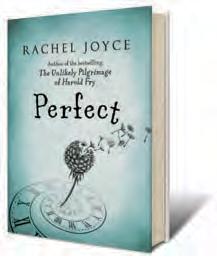
by Rachel Joyce (Doubleday, £14.99; ebook, £8.83) Well, this is an odd one. Rachel Joyce’s first novel The Unlikely Pilgrimage of Harold Fry was a huge word-of-mouth hit, much praised for its ability to deliver crunching emotions in straightforward language. The same is certainly true of her second, but this time accompanied by a plot far more unlikely than anything Harold Fry got up to.
Byron is a 12-year-old private schoolboy who, in 1972, becomes obsessed with the two “leap seconds” due to be added to that year. Indeed, he even imagines (or possibly notices) that when they are, they cause a gap in time during which his mother runs over a young girl. Not only that, but he convinces his mum that this really happened, setting in train a series of increasingly tragic events.
Joyce writes beautifully from the boy’s point of view. She’s extremely good on family life, serves up any number of memorable characters and delivers an undeniable emotional punch. Yet all the time, the reader faces a choice: either abandon yourself to the sheer quality of the storytelling or keep thinking, Hold on a minute (or even two seconds) and wonder
BY JAMES WALTONJames Walton writes and presents the BBC Radio 4 literary quiz
The Write Stu


In ?
NAME THE AUTHOR
Answer on page 134
Can you guess the writer from these clues (and, of course, the fewer you need the better)?
1 In a Waterstone’s poll of the greatest 20th century books, two of his were in the top three.
2 Two popular TV series are named after phrases in his most famous novel.
3 He took his pen name from a river in Su olk.
if the story being told so well is ultimately just too bonkers. Personally, I’d recommend the first option.
by Lottie Moggach (Picador, £14.99; ebook, £7.55)
Even before publication, Lottie Moggach’s first novel has been causing quite a stir in the books world—and it’s not hard to see why. All the elements are in place for a smart and darkly funny commercial success: a high-concept plot, a terrific narrator and plenty of big questions about human identity in an online world.
In fact, the beginning (the high-concept part) takes a bit of swallowing, but the e ort is well worthwhile.
Tess—sexy, popular but troubled—has decided to kill herself. Not wanting to upset her friends and family, though, she comes up with a plan. She hires narrator Leila to impersonate her online after “check-out day” with emails and Facebook updates from her supposed new life abroad. Plain, lonely and fairly troubled herself, Leila sets about her task with tragicomic earnestness, working especially hard on sounding “sassy”. (Leila tends to put inverted commas around any word even vaguely racy.) Both the comedy and pathos then hit new heights as she starts an email exchange with one of Tess’s many ex-boyfriends...
The Etymologicon by Mark Forsyth (Icon, £8.99) An endlessly fascinating and witty guide to the derivations of English words, both familiar and obscure. A must for word lovers.
Bones Are Forever by Kathy Reichs (Arrow, £7.99) In a strong month for crime— our favourite beach reading, it seems—Reichs’s forensic anthropologist Tempe Brennan is back for another tautly plotted thriller.

Merivel by Rose Tremain (Vintage, £7.99) Older but no wiser, Robert Merivel returns to Charles II’s court in this hugely enjoyable sequel to Restoration.
Sunshine on Scotland Street by Alexander McCall Smith (Abacus, £7.99) His second-biggest selling series after The No. 1 Ladies’ Detective Agency. As irresistible as ever.
Admittedly, the book’s ending is slightly unsatisfactory too—suggesting that Moggach has yet to perfect the arts of either take-o or landing. When the novel is airborne, however, it really does fly beautifully.

Patrick Leigh Fermor by Artemis Cooper (John Murray, £9.99) Superb biography of the great adventurer and travel writer (left), once described by the BBC as “a cross between Indiana Jones, James Bond and Graham Greene.”
Why it’s never too late to get back in touch with old schoolmates, have adventures all around the world—and embarrass your grandchildren

Once upon a time, Hilary Linstead and Elisabeth Davies were good friends at school in Cheltenham. As adults, they lost contact. Hil followed a man to Australia when she was 21, while Liz worked in the Civil Service and chose what she rather proudly calls an “arid emotional life”.
Then, having taken early retirement at 55, Liz travelled to Sydney to visit another old school chum who reintroduced her to Hil, by then divorced and with a successful career in the arts. The two women hit it o again immediately, and as the red wine flowed, decided they’d make great travelling companions. Luckily, they were right—and more than 15 years later have had adventures together all over the world, from Lima to Latvia, from the Galápagos Islands to the Scottish ones. The result is this joyous book—written, the prologue explains, as “a celebration of the fact that two women of advanced years can still get out and have a bloody good time”.
On the face of it, the friendship is an unlikely one. Liz travels light, starts the day with a brisk walk, and would always prefer a museum to a meal—or so she claims. Hil, who narrates the book, takes everything on holiday that she could possibly need, enjoys a good lie-in and has a food policy that consists of eating until she can “eat no more”. She can also get pretty exasperated when Liz gives one of her many historical or political lectures. Yet, as the years go by, the women don’t just negotiate their di erences, but seem actively to enjoy them. (Not that this prevents them from sometimes being incredibly rude to each other.) What they do share, mind you, is a fondness for booze that sees them giving a full-throated rendition of “Danny Boy” in the African bush and telling strangers wildly untrue stories about their lives.
Because Hil writes so well, the book is a fine travelogue,
RD EXCLUSIVE: HIL AND LIZ’S CHOICE OF FAVOURITE TRAVEL BOOKS

HIL
Travels with My Aunt by Graham Greene Greene described this as “the only book I have written just for the fun of it”. And I agree— it is great fun.
Under the Dragon by Rory
MacLeanA journey through 1990s Burma, where MacLean witnessed the shattering brutality of the dictatorship.
The Story of San Michele by Axel Munthe
This globe-trotting Swedish psychiatrist had a love a air with Capri—where, ►

complete with proper background information and pin-sharp observations. Nonetheless, the most striking thing about it is the quality of their friendship, and the sheer amount of fun they have.
We join them here in Lithuania, where, unusually, they’re on a trip with someone else: Hil’s rather serious-minded 15-year-old granddaughter Scarlett. And, apart from that, all you need to know is that “BO and BB” is the two women’s (much-used) abbreviation for Break Out and Behave Badly…
As we explored Riga, Liz found more and more fine Art Nouveau buildings and Scarlett responded to her excitement. ‘The main architect of all these buildings was a man called Eisenstein, the father of the film man,’ Liz told her, making the unlikely assumption that Scarlett would be as familiar with the architect’s son as she would be with Beyoncé...
Back at the hotel, I lay like a whale in the bath, recovering from the day’s exertions, while Scarlett brought her journal up to date and Liz went out again to explore. She returned in some excitement: ‘I’ve found the perfect place for our dinner. It’s a medieval-themed basement restaurant with wooden tables and chairs and lashings of helmets, armour and swords hanging from stone walls. You’ll love it.’ I looked doubtfully in Scarlett’s direction.
‘Go on, Ga, let’s try it,’ she said.
This time it was I who BO’d and BB’d. I got stuck into two large glasses of the local rough red and soon leant across the table to speak to the people next to us—a tiny Thai lady in her forties smooching with a tall, blond Dutch man in his twenties.
►
Next stop Alice Springs: Hil (right) and Liz in Darwin, preparing to board Australia’s most famous train
Growing Old
Outrageously: a Memoir of Travel, Food and Friendship by Hilary Linstead and Elisabeth Davies is published on July 4 by Allen & Unwin at £8.99
‘I’m Hilary. How did you two get together?’ I said to the woman. ‘You’re a surprising duo.’
Scarlett cringed. I was already tipsy.
‘Why do you think that?’ said the woman, smiling. She held out her hand. ‘My name’s Chit-dee and this is Anton. Do you think I’m too old for him?’
‘Well!’ I wasn’t prepared for such a quick comeback and stumbled, catching sight of Scarlett’s horrified expression.
‘It’s always hard to tell people’s ages—’ I paused in the nick of time. Fortunately Chit-dee and Anton played along.
‘We met at a party,’ said Anton.
‘We were both su ering from broken hearts, so we spent a lot of time consoling each other,’ added Chit-dee.
“I put the helmet from one of the suits of armour on my head, imagining that I was amusing my new friends”
‘Oh, so you were both on the rebound. Were either of you married?’ I asked, completely ignoring Scarlett’s discomfort. ‘No, I was single,’ explained Anton. ‘But Chit-dee used to be married, and was going through a di cult divorce.’
‘We won’t go there,’ said Chit-dee.
‘It may have been on the rebound,’ said Anton, quickly, ‘but we’ve been together for four years now and I’m as madly in love with her today as the day we met.’
Fortunately, just at that moment our food arrived...
Later, while we were waiting for the bill, I put the helmet from one of the suits of armour on my head and lowered the visor, imagining that I was amusing my new friends. Chit-dee and Anton laughed politely, but Liz wasn’t impressed—this was her territory. Scarlett removed the helmet and propelled me towards the door. Waving cheerily to Chit-dee and Anton, I called out loudly, ‘Lovely to meet you. See you again soon.’ When we got outside, Scarlett hissed in exasperation, ‘Ga, that was really embarrassing.’
Fair enough, I thought, as the cold night air hit me and I started to sober up.

at the turn of the 20th century, he built his home, the exquisite Villa San Michele. ◄

The Travel Book: A Journey through Every Country in the World by Lonely Planet
A model of succinctness. All the traveller needs to know about 230 countries.
A Month by the Sea: Encounters in Gaza by Dervla Murphy
The indomitable 81-year-old writes about injustice with heart-warming and heartbreaking vividness.
Going Where My Pig Is Headed by Sara Sharpe
The author abandons a middle-class life in middle age to wander round the Middle East on $5 a day—like travellers the world over, “to find herself”.

Award-winning actress Janet McTeer, 51, is known for roles in Parade’s End and Waking the Dead. She stars in new historical drama The White Queen, on BBC1 this month.

I first read this when I was 18 and a novice at Rada. In the days of Stanislavski, the book was almost anti-“method”, noting that there are many ways to climb the proverbial mountain. Acting, it suggested, shouldn’t be about polished performances where the audience says afterwards, “Marvellous, darling! Gin and tonic?” It should move and challenge, and sometimes frighten. The book became my Bible, Hagen my icon. In the late 1990s, she came to see me backstage in New York when I was in Ibsen’s A Dolls House. We went out afterwards and drank margaritas.
When this “lesbian” novel was written in 1928, it was hugely controversial. I read it in 1990 to help my portrayal of Vita Sackville-West (who had a lesbian relationship) in the BBC adaptation of Portrait of a Marriage. I found it profoundly moving, mostly because it was about someone who didn’t fit into society. I suppose it chimed with me because I’d always been a square peg in a round hole myself. Don’t get me wrong, I adore my family, but I’m definitely the odd one out. My mother always said if I didn’t look so much like her she’d believe I’d been swapped at birth! In my twenties, the book echoed my feeling of not quite knowing who I was or where I belonged.


I’m a prolific reader and have been since I first picked up The Hobbit. It was this book that opened my mind to the written word. Up to that point, I’d read lots of Enid Blyton—Mallory Towers and the Famous Five. But The Hobbit took reading to a new level entirely. It was a book about a whole other world, peopled by extraordinary characters. It could be funny or dark and sinister. Recently, I’ve been reading the book aloud to my ten-year-old stepson, who loved it as much as I did, and the pleasure of sharing it with him was huge. I still have my original copy, complete with an inscription, written in childish handwriting: “Janet McTeer, aged eight, York, England, The World, The Universe.” And that book really did open up the universe of books for me. Thank you, Tolkien! ■





At only 4kg/8.9lbs, the XL Signature is better than ever at picking up dirt whilst its ergonomic design makes vacuuming a breeze. Its unique brushroll grooms deep into your carpet to lift the pile, remove pet hair and dirt and prolong carpet life. But it’s just as effective on hard floors. Ideal for pet owners and allergy sufferers, the XL Signature comes with a three year manufacturer’s warranty and a 30 day money back guarantee. Until 02.08.13 Oreck is offering Reader’s Digest readers £50.98 off the XL Signature making it just £199 plus free standard p&p*, with interest free payments available. For details, visit www.oreck.co.uk/RD136T Call 0800 869 669, quoting RD136T.


To advertise on these pages please contact Nick Page Tel: 07789178802
Email: nick.page@madisonbell.com

A Great British Touring Holiday
- you know you've always wanted to try it!
Family run business for 25 years Weekly hire or short breaks. Call 01926 813644
www.NaptonNarrowboats.co.uk Specialists

CD/DVD cabinets/TV /Hi-Fi furniture
Wide range of woods and finishes
Contemporary or traditional design
For further information, please email us info@deanwattsbespokefurniture.com or phone 01295 760017 or 07929 032574


Market Place, Ambleside, Cumbria LA22 9BU Tel: 015394 33329
www.fwtyson.co.uk

A GORE-TEX lined and GUARANTEED WATERPROOF shoe in brown or black leather. Deep tread soles and MEPHISTO air bag shock absorber in the heel for instant comfort. Sizes 6-13, including half sizes. £149.95 Postage free.
WIN £50 for every reader’s joke we publish. Email excerpts@ readersdigest.co.uk or go to facebook.com/readersdigestuk
¶ One day, Joe and his wife Martha go to a local fair. A man is selling rides in his show plane for £10. Joe says, “Martha, I’d like to try that.”
She replies, “But Joe, you know that money is tight. £10 is £10.” So Joe goes without.
They return to the fair every year, and the same thing happens—he asks, she says no.
Finally, when they’re 70, Joe says, “I’m 70, and I don’t know if I’ll ever get another chance to ride that plane. Please, Martha!” But she says no. Joe weeps.
The pilot, standing nearby, overhears. He says, “I have a deal for you. I’ll take you up together, and if you can both do the entire trip without making a single sound, I’ll give the ride for free. But if either of you says a word, it’s £10 each.” Martha and Joe nod in agreement.
The pilot takes them up and starts to do loop-the-loops, dives, climbs and spins. No sound. The pilot lands the plane, looks back at Joe and says, “Well, I have to hand it to you—you didn’t make even the slightest noise, and that was my best stu .”
Joe looks back at the pilot and says, “Well, I was gonna say something when Martha fell out, but £10 is £10!”


“Bad news, boys. The Cassidy brothers just rode into town and there’s gonna be a gunfight at sundown. We’ll have to miss Pilates!”

¶ Do you know who makes me cross? The green man at the tra c lights.
Sean Wearden, Birmingham
¶ Too many people driving o without paying for petrol. Can’t help feeling Formula One drivers set a bad example. Comedian Milton Jones, by Twitter
¶ I asked my wife what women really want, and she said it was attentive lovers. Or maybe it was “a tent of lovers”. I wasn’t really listening.
¶ Did you hear about the baby born in the high-tech delivery room? He was cordless. Seen on the internet
¶ “I need to talk to you” is the one sentence that has the power to make you remember every bad thing you’ve ever done in your life. Comedian Aaron Karo, on ruminations.com
¶ I wonder if Jeremy Irons ever quietly laughs to himself while he’s ironing.
Comedian Jon Friedman
I carry a picture of my kids in my wallet. It reminds me of why there’s no cash in there
¶ Q: How does the man on the moon cut his hair?
A: Eclipse it.
¶ Q: What is Tom Hanks’s Wi-Fi password?
A: 1Forrest1
¶ Don’t ever believe anything an atom says. They make up everything. Seen on Reddit
►
If this too shall pass, now would be goodUS news anchor Robin Roberts

Award-winning comedian Josh Widdicombe is 5ft 6.5in tall, and his favourite TV show is The Simpsons. Each month, he lets us know just exactly what his problem is. I have an admission to make. There’s no way I’d rather spend the month of July than doing nothing—or, to be more specific, watching cricket. I understand some may see the sport as boring, but these people don’t understand that this is the fun of it: it’s slow, boring and catatonically relaxing.
A slow and steady nothingness; it’s the same reason I enjoy sleep, or other people enjoying fishing (which isn’t for me, as I draw the line at wearing waders).
If anything, cricket should be even slower

and more boring; there’s just too much action. If I go to make a sandwich, there’s every chance I’ll miss a man catching a ball or a commentator telling an anecdote about a posh dinner he went to. It can come that thick and fast.
Apparently they’re trying to speed the game up to make it more popular with the young. They have it all wrong. Slow it down further, until it’s just 12 hours of standing in a field. That’s what people really want from their summers: an excuse to do nothing in the sun. Without having to wear waders.
These fun but nonsensical quips were submitted to a kids’ jokes website. The moderator couldn’t use them, but posted them at badkidsjokes.tumblr.com
¶ How do you make a potato? You make it inside your brain.
Well then eat it in a toilet with a red t-shirt
¶ Why can’t an elephant watch TV? Because he’s too big.
¶ Why does the spaceman go to a moon? To fart.
¶ What did the tree say to the other trees? You have bird poop in your mouth, you know.
Owners pointlessly embarrass their pets at animalsdressedasother animals.tumblr.com


“I’ve lost count of how many times I’ve had to turn that kid away”

“ Why are women no good at parking cars (which is certainly true where I’m concerned)?
“Because they’ve always been told that a tiny gap is nine inches. (Can you print that?)” HORSE-SHEEP CAT-LION






¶ I’ve decided I want to learn to be ambidextrous. I’m already halfway there! Seen on the internet
¶ Someone just threw an Xbox at my head. In this case, it’s safe to say video games are responsible for violence. Comedian Aziz Ansari, on Twitter
¶ I was asked if I did exercise in the morning to keep fit. I replied that of course I did. Up, down, up down. And then I do the same with the other eyelid. Sue Gerard, St Helens, Merseyside
¶ Q: What’s red and smells like blue paint?
A: Red paint.
¶ I popped into the payday shops down the road to borrow a pen.
They said that was fine, but I’d have to give them 70 pens back by the end of the week. Seen on the internet
Ladies and gentlemen, please welcome Felicity Ward
FAVOURITE JOKE?
It’s a really dumb joke. “What’s so good about Switzerland? Well, the flag’s a big plus!”
FAVOURITE HECKLE?
I was asking a lady which airline she worked for, since she was an air hostess. I said, “Is it [Australian low-cost airline] Tiger? It’s OK if it’s Tiger.” And then this old lady on the other side of the audience—she was about 70—called out, “No, if she worked for Tiger she wouldn’t have made it to the show on time.” It was amazing.
FUNNIEST THING THAT’S EVER HAPPENED TO YOU?

Australian comic Felicity Ward is at the Edinburgh Festival next month with her new show Irregardless
I’ve slipped on two banana peels. Both times, I slipped on the peel, and then looked around to say, “Hey guys! Look what’s happened!” But there was no one there to see. Then I laughed like an insane person.
FAVOURITE TV SHOW?
The Simpsons, series one to eight. I still quote from it. Last night, I was specifically talking about the episode where Homer falls in love with Mindy at work, and he writes what he wants to say to her on his hand, and because he’s sweating it comes out as, “Mu... Murphy...You, you are an elf...uncontrollably...I think!” Then, for no reason, this guy walks past with a giant hand saying, “I’m tired of all these jokes about my giant hand...”

FINALLY, WHO’S YOUR COMEDY INSPIRATION?
Whenever I go to my family’s house, I have my notebook at the ready. My mum recently said she got into a fight with someone at work. I said, “Are you OK?” She said, “Oh yeah, it usually takes one or two fights for people to get used to me.” I was like, “How do you still have a job?” She’s 60. n
Grab a cup of tea and a biscuit and bend your mind to these six puzzles, ranging from the mildly puzzling to the pen-chewingly fiendish
1. star siGns
Which one of the four options given below completes the set?





2. cracked pots
Again, find the missing element from the options.





3. MaGic square
This square is made up of five rows. Fill in the missing numbers from 1–9 to make the sum of 65 for each vertical, diagonal and horizontal line.

4. sudoku To win, you have to put a number from 1 to 9 in each outlined section so that: • every horizontal row and vertical column contains all nine numerals (1–9) without repeating any of them; • each of the outlined sections has all nine numerals, none repeated. If you want even more of a challenge, try timing yourself too.
difficulty HHHH
* Entry is open only to residents of the UK, Channel Islands, Isle of Man and Republic of Ireland aged 18 or over. It is not open to employees of Vivat Direct Limited (t/a Reader’s Digest), its subsidiary companies and all other persons associated with the competition.
5. Three iTeMS Or fewer Emma bought three items in the supermarket. When she got to the checkout, the operator tapped in the prices. However, he somehow managed to multiply the three numbers together instead of adding them. Fortunately, the result was just the same: £90.09. How much did each item cost?

Answers
1. Star signs: A. 2. Cracked pots: D. 3. Magic square: Note also that if you draw an “x” (for example, on 1, 7, 13, 20 and 24) or a “+” (for example, on 15, 7, 4, 23 and 16) on five numbers on the grid, the sum of these five numbers is still 65.
£50 prize question (answer will be published in the August issue)
Place a number in the central box by which all the numbers can be divided without leaving a remainder. The number is greater than 1

4. Sudoku: If you solved it within: 15 minutes, you’re a true expert; 30 minutes, you’re no slouch either; 60 minutes or more, maybe numbers aren’t your thing.
5. Three items or fewer: £13, £77, 9p.
The first correct answer we pick on July 5 wins £50!* Email excerpts@readersdigest.co.uk
Answer to June’s prize question:
One solution is: Pink, pick, peck, deck, duck, puck, puce
And the £50 goes to… Sharon Wallis from Manchester

Think of a witty caption for this picture and you could beat the experts at their own game. The three best suggestions will be posted on our website in mid-July alongside an anonymous caption from our professional cartoonist. Visitors can choose their favourite—and if your entry gets the most votes, you’ll receive £100 and a framed copy of the drawing. Submit to captions@readersdigest.co.uk or the address on p6 by July 12. Enter and vote online at readersdigest.co.uk/caption. We’ll announce the winner in our September issue. ■

It’s hard to believe that the readers and cartoonists were neck and neck not long ago. This month, the o cial e ort from Rob Murray, “Your essay on The Iliad? Epic fail,” was trounced by Grahame Jones’s caption, “Boris, take another 100 lines for dying your hair.” It’s champagne for the amateurs and humble pie for the professionals once again.

Cool, calm and complicated—Brenda Blethyn gives us the inside story on filming the new series of Vera
• “My dad, the Great Train Robber”
• Holiday blues? Here’s how to beat them
PLUS Bonus Read: On the Trail of the World’s Most Dangerous Smugglers
specsavers.co.uk

Includes all frames, lenses and Extra Options. Excludes reglazes, safety eyewear, contact lens products, non-prescription sunglasses. Applies to one pair of glasses, from £69 range or above. Cannot be used with other o ers. Monday to Friday. Discount not transferable in whole or part for cash. SKUs 25381658, 25144444. ©2013 Specsavers. All rights reserved.

